Annual Report – 2023
Annual Report Overview
Who We Are
Interchange Recycling—the trademark and trade name of the British Columbia Used Oil Management Association—is a not-for-profit society that operates a province-wide program dedicated to supporting the collection and recycling of lubricating oil, oil filters, oil containers, antifreeze and antifreeze containers, from both the do-it-yourself market as well as the commercial and industrial markets.
Our goal is to provide British Columbians with an eco-friendly and cost-effective way to manage program materials by keeping them out of the environment and managing them at end of life. Each year, approximately 50 million litres of oil and antifreeze are collected and responsibly managed through our program.
Through close collaboration with our key stakeholders, Interchange Recycling helps prevent automotive fluids and materials from harming the environment and instead, turns them into something useful. Working together we’re improving the environmental and economic outcomes of everyone. It’s what we call moving forward through balance.
How We Help
Year over year, we are becoming increasingly aware that throwing away or dumping oil products, not only harms the environment, but also wastes a valuable non-renewable resource. One of the unique features of the Interchange Recycling program is the significant environmental, economic and social benefits the program delivers. The management of program materials, through partnerships with the registered processors, has the potential to achieve goals and objectives in the areas of sustainability, circular economy, CO2 reductions, carbon offsets, zero waste and pollution prevention.
Our program and partners are an example of how a regulated EPR (Extended Producer Responsibility) program can support private sector innovation, using proven technologies, to develop economic growth and support a circular economy here in BC.
What We Do
Formed under the British Columbia Society Act in 2003, Interchange Recycling has operated a province-wide collection and recycling program for used oil, oil filters and used oil containers since August 2003 and for antifreeze since 2011. This collection program includes the do-it-yourself market as well as the commercial and industrial markets.
Interchange Recycling is managed by a multi-sector Board of Directors with representatives from various sectors, including manufacturing, automotive, retail, local government and the public at large. Interchange Recycling provides incentives to recyclers to ensure that oil, filters, antifreeze, and containers throughout BC are collected and managed. The collectors pick up the materials from generators and publicly accessible recycling centres across the province and deliver the materials to registered processors, where they are processed to the point that they can be reused or sold as raw material inputs for manufacturing or energy products.
Letter From The Chair
On behalf of Interchange Recycling, I am pleased to present the 2023 Annual Report.
This past year marked a significant period of transformation for our organization as we celebrated our 20th Anniversary with the introduction of our new brand. In June, we proudly transitioned from the British Columbia Used Oil Management Association to Interchange Recycling.
Our rebranding endeavor went beyond a mere name change. It involved a comprehensive process that enabled both the Board and Staff to delineate short and long-term objectives for our internal operations and external engagements. This strategic initiative positions us not only for the next 20 years but also for the years beyond.
Operationally, we continue to improve our network of public recycling centers, with a focus on enhancing infrastructure such as our modified sea containers to facilitate the safe collection of program materials. In addition, we awarded 12 new infrastructure grants to local governments and municipalities across BC and supported six residential collection events.
Our flagship Ambassador Tour made a successful comeback in 2023. The Interchange Recycling community engagement team traversed the province throughout the summer, attending 16 automotive and family-focused events and visiting seven return collection facilities.
The sustained success and growth of Interchange Recycling have positioned us as a global leader in our field. Consequently, we have been approached to provide consultation to several countries in their development of Extended Producer Responsibility (EPR) programs. Moreover, we are exploring opportunities for expansion within Canada, with plans underway for the launch of our first program outside of British Columbia, coinciding with the coming launch of EPR in Yukon.
Undoubtedly, 2023 was a year marked by purposeful growth for Interchange Recycling. With a steadfast Board of Directors and a dedicated senior management team at the helm, we are confident in our ability to sustain this momentum and achieve even greater success in the years ahead.

Brian Ahearn
Board Chair, Interchange Recycling
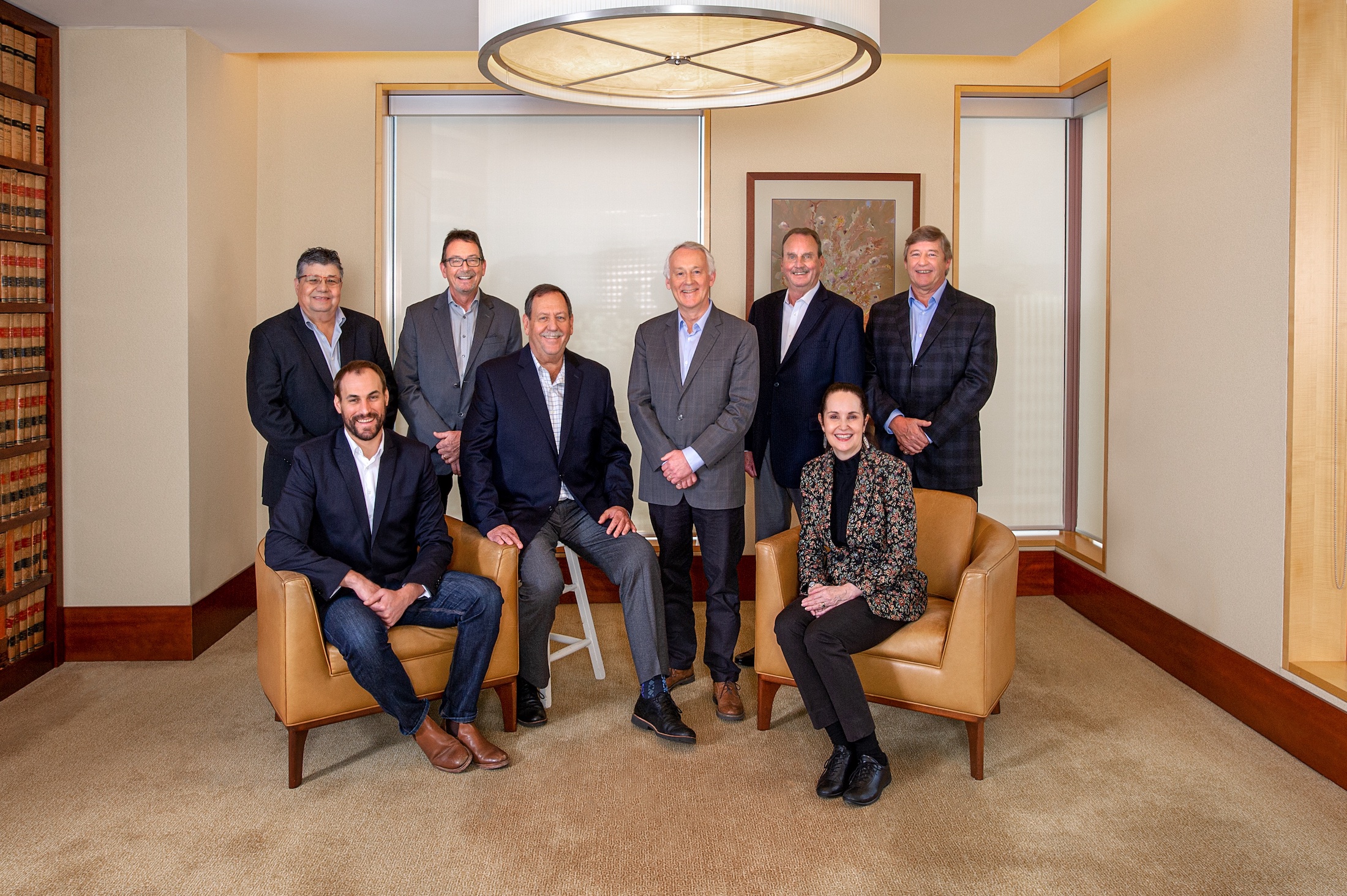
| 2023 BOARD OF DIRECTORS |
|---|
| Brian Ahearn, Chair Oil Industry |
| Lonnie Cole, Secretary Filter Industry |
| Natalie Zigarlick, Treasurer Public Member |
| Don Hetherington Mr. Lube Canada |
| Dan Higgins Canadian Tire |
| Sam DeGuilio Antifreeze Industry |
| Vincent Gauthier Petro-Canada Lubricants Inc. |
| Irfaan Hasham Global Automakers of Canada |
| Gord Klassen City of Fort St. John |
| Loulia Kouchaji Honda Canada |
| Wayne Marees Oil Industry |
Forward Through Balance
At Interchange Recycling, we prevent automotive fluids and materials from harming the environment and turn them into something useful. And more importantly, we balance the industry’s financial health and the health of everyone else. Efficiency, effectiveness, and continuous improvement are the keys to our balance, which means bringing on new partners, more materials and refining our process.
Our scale never rests. Our balance is never still. People need to move and progress must be made but not at the cost of our planet. Because the only acceptable results are better environmental and economic outcomes for everyone.
For the next century, we believe the only path is forward through balance.
A New Look For Our 20th Anniversary
At our Annual General Meeting on June 9, 2023, the BC Used Oil Management Association (BCUOMA) became Interchange Recycling.
Why the change? On our 20th anniversary, we took the opportunity to look ahead to the next 20 years and beyond, and it became clear that our old name wasn’t going to serve us in the long term. We needed a name that better reflected our business, our members and our future.
The rebranding process helped us examine who we were as an organization and what we wanted to accomplish. You may be asking, why we chose the name Interchange. It’s because we’re always active. Like a major highway interchange, there is a constant flow of materials arriving into the market and coming back into our operations. Likewise, we direct the traffic for members, government, collectors & processors, public recycling centres, and of course, the general public. In short, we move forward through balance.
While the name has changed, our primary business hasn’t. As Interchange Recycling, we remain committed to working with the same members, collectors and processors but as times and needs change, we know we may need to collaborate with more people too. Our goal is to help business and industry achieve better environmental outcomes for everyone.
International Collaboration
In 2023, Interchange Recycling reached new heights as we expanded our presence on the global stage. Our CEO, David Lawes, emerged as a sought-after authority, offering invaluable advice and insights to organizations worldwide as they navigated the complex landscape of Extended Producer Responsibility (EPR) legislation. Through consultations and collaborations, we had the privilege of contributing to the growth of numerous initiatives, paving the way for a more sustainable future on a global scale.
At Interchange Recycling, we are deeply grateful for the opportunity to share our knowledge and expertise, empowering organizations to embrace responsible stewardship and adopt innovative solutions. As we continue to champion sustainability initiatives worldwide, we remain committed to driving positive change and inspiring progress in every community we serve.
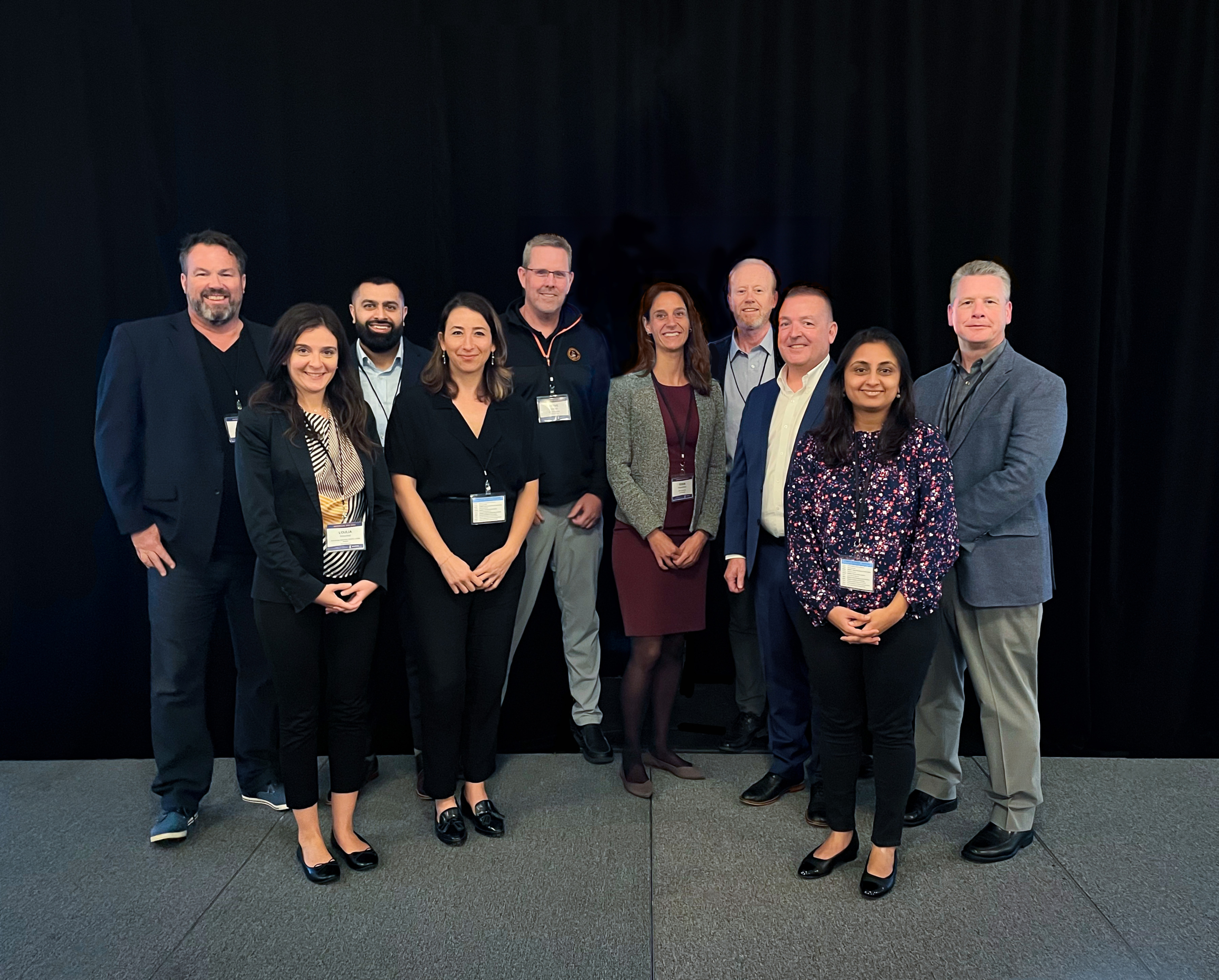
Communications & Public Outreach
In addition to maintaining a comprehensive online presence, Interchange Recycling is dedicated to utilizing various educational and communication channels to ensure widespread awareness of our program. Our website serves as a central hub for accessing timely and pertinent information about used oil and antifreeze recycling, providing visitors with easy access to resources, FAQs, and program updates.
Furthermore, we employ traditional outreach methods such as information brochures, inclusion in municipal recycling calendars, and showcasing informative table top displays and other visual aids at community events and public venues. These tangible materials serve as invaluable tools for engaging directly with the public, offering clear and concise messaging about the importance of proper recycling practices.
Recognizing the importance of social media in modern communication, Interchange Recycling actively leverages platforms like Facebook to connect with a wider audience and disseminate program information. Through regular updates, engaging content, and interactive features, we strive to foster ongoing dialogue, raise awareness, and encourage participation among community members.
We also actively engage with media outlets to amplify our messaging and reach broader audiences, working closely with journalists and reporters to share stories, updates, and key information about our recycling program through press releases and interviews. Cultivating strong relationships with media partners across various platforms—print, broadcast, and online—results in consistent coverage and visibility in local, regional, and national news outlets. Through strategic media relations, Interchange Recycling effectively communicates our mission, achievements, and initiatives to the public, further reinforcing our commitment to environmental stewardship and community engagement.
Employing a multifaceted approach that combines online resources, traditional outreach methods, and social media engagement, helps ensure the public remains informed and empowered to make environmentally responsible choices regarding used oil and antifreeze recycling.
2023 Awareness Campaign:
- Channels: TV, outdoor, digital, social, search
- Estimated Impressions: 24 million+
TV Ad:
Bus Ad:
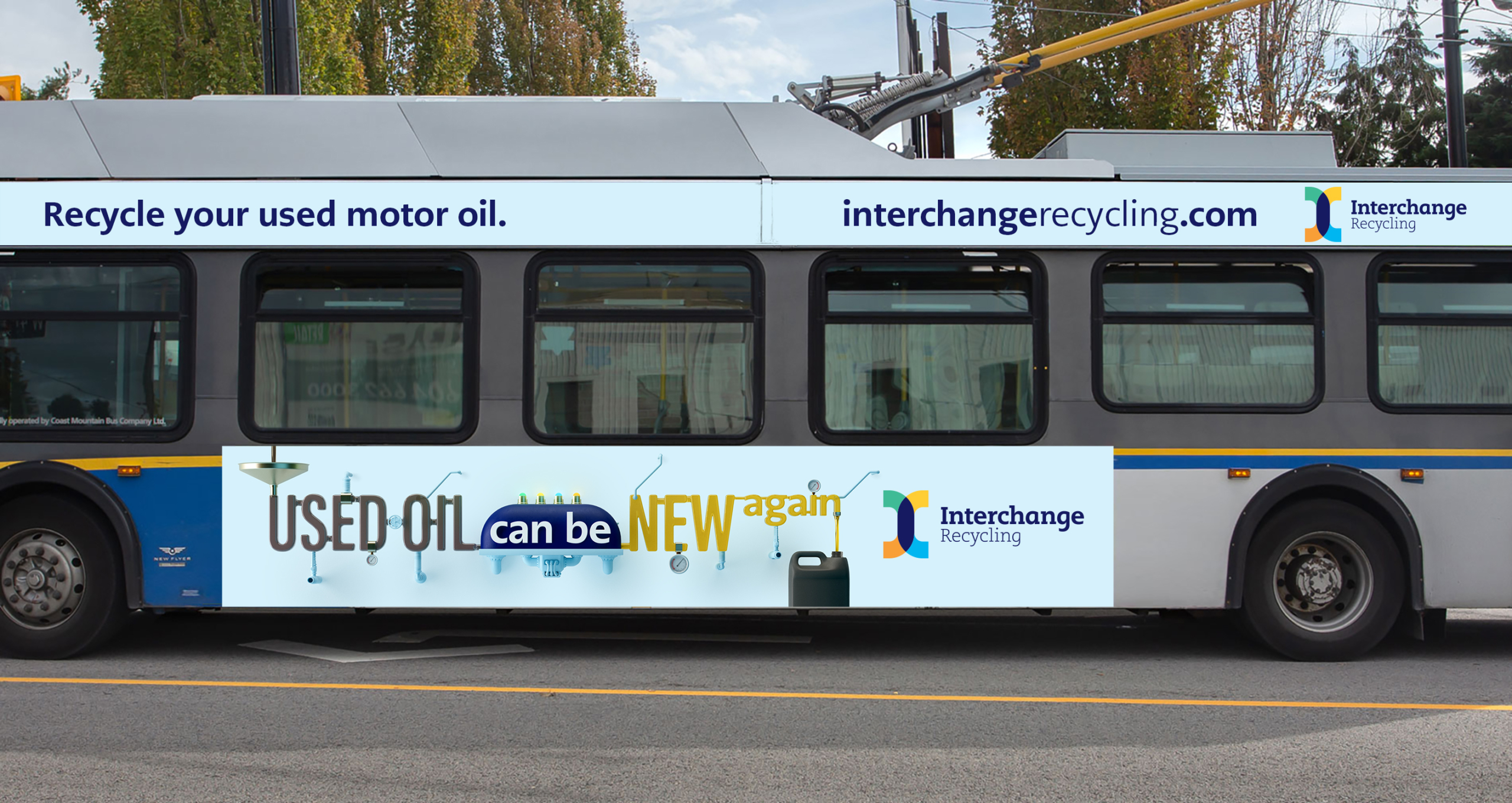
Brand Campaign (Social & Digital Ads):
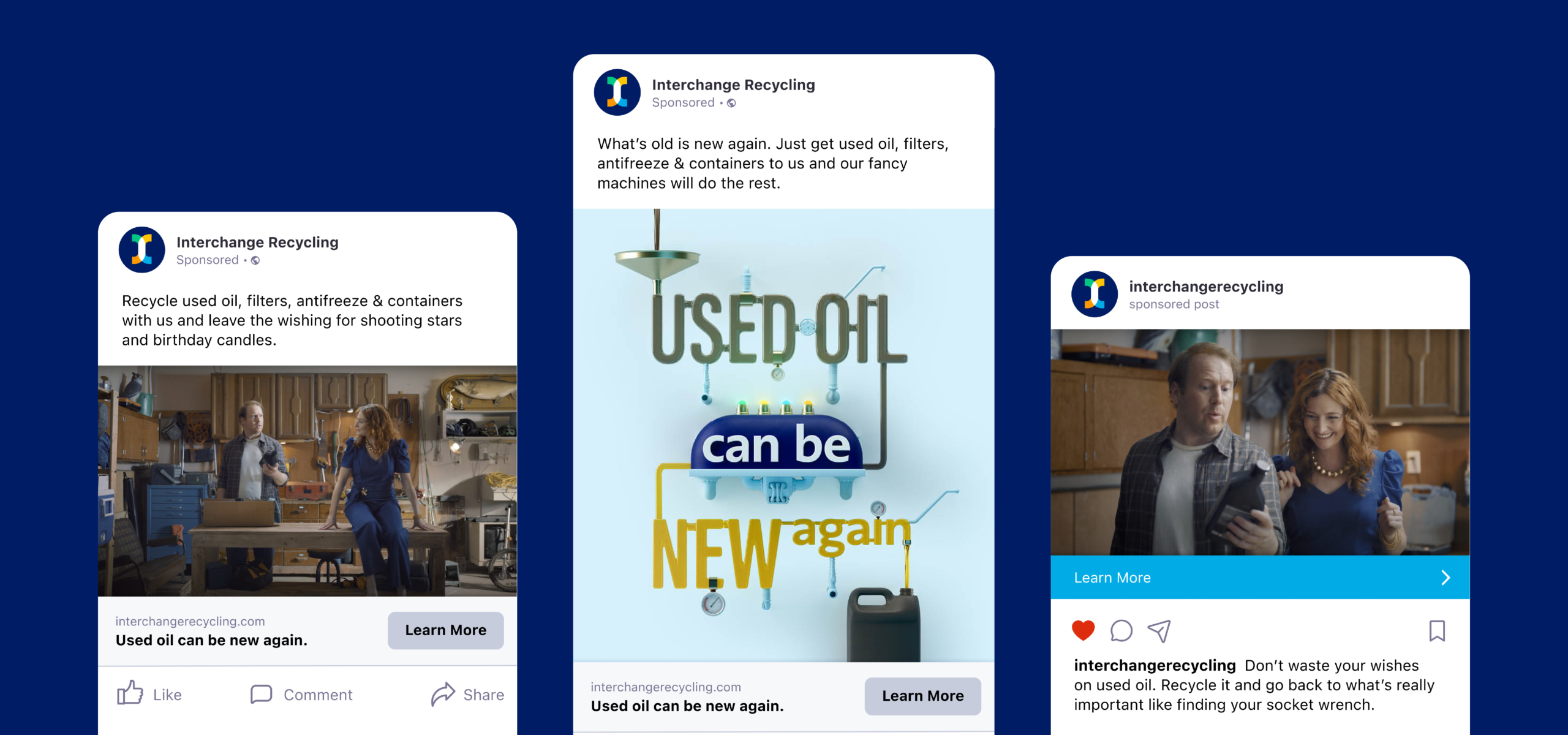
2023 Public Relations:
- 29 Press Releases Sent
- 128 print, digital, broadcast and social media mentions
- Estimated Reach: 18 million+

2023 Ambassador Tour
Our community engagement team travelled around the province in 2023, attending 16 high-visibility events and visiting seven Return Collection Facilities between June and September. The Tour helped to increase awareness for our program and inform people of the locations of used oil recycling facilities. The Ambassador Tour received free media coverage that reached more than 124,000 British Columbians.
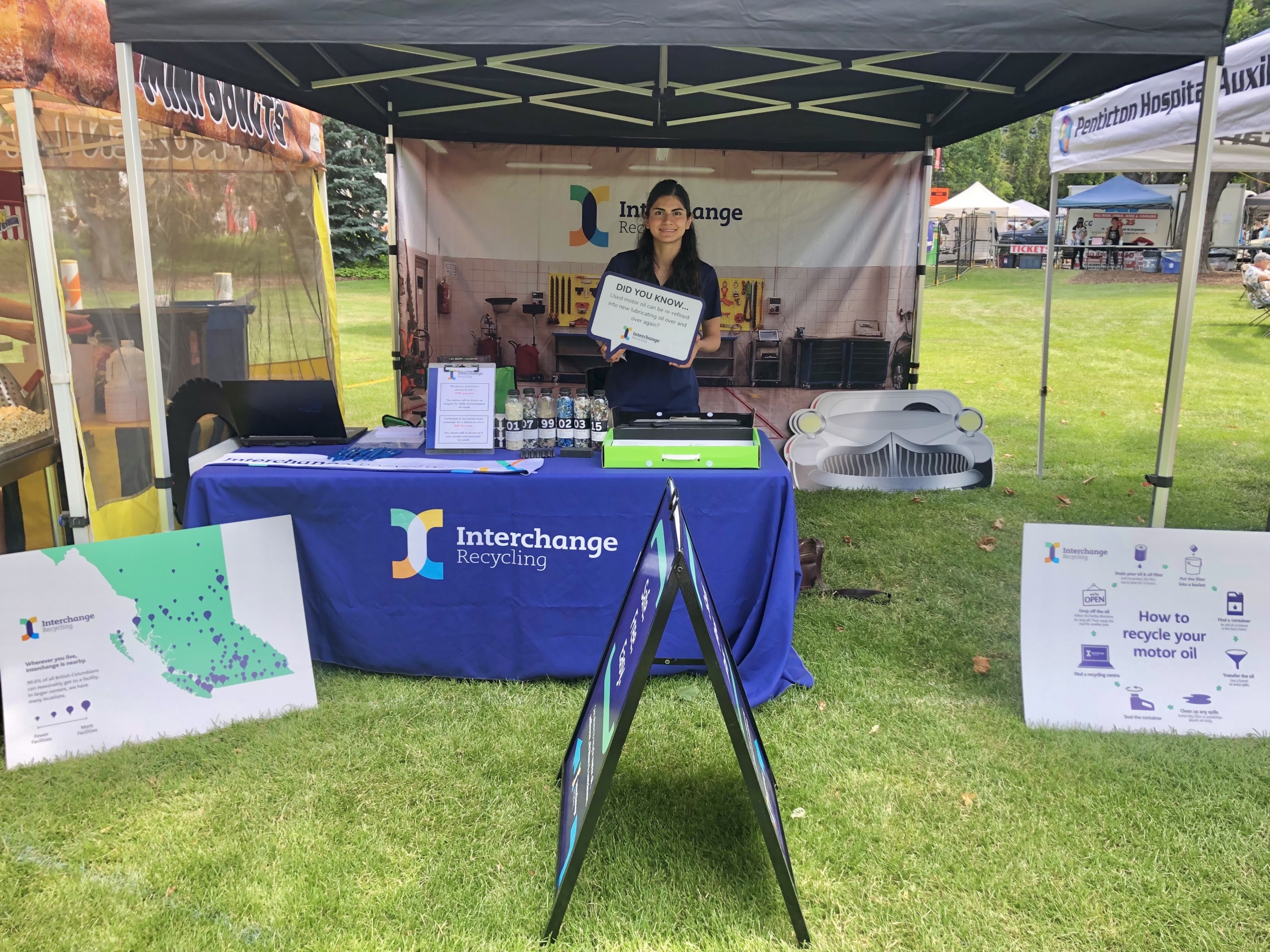
Consumer Awareness
With over two decades of operation in British Columbia, Interchange Recycling has established a highly successful program with consistently impressive recovery rates. While a significant portion of the products collected originate from commercial facilities, our communications campaigns primarily target consumers who manage their own oil or antifreeze changes and utilize our extensive network of public recycling centres across the province. In 2023, our annual survey revealed an increase in awareness among this group, reinforcing our commitment to educating DIYers across BC about the importance of recycling their used oil responsibly.
Furthermore, we recognize that most vehicle-owning British Columbians actively participate in our program without explicit awareness. By patronizing licensed facilities connected to Interchange Recycling’s commercial collection network, they unknowingly contribute to responsible material management and recycling. As part of our ongoing communications strategy, we aim to engage with these program users, affirming their environmentally conscious actions and encouraging continued participation.
To ensure the efficacy of our efforts and maintain accurate insights into consumer behaviour, Interchange Recycling actively participates in and financially supports the biennial consumer awareness survey conducted by the Stewardship Agencies of BC (SABC). Additionally, we conduct our own annual survey in collaboration with an independent third-party survey provider. Employing comprehensive methodology, both surveys encompass respondents from diverse geographical regions and demographic backgrounds, enabling us to gather robust and reliable data essential for refining our outreach strategies and optimizing program impact.
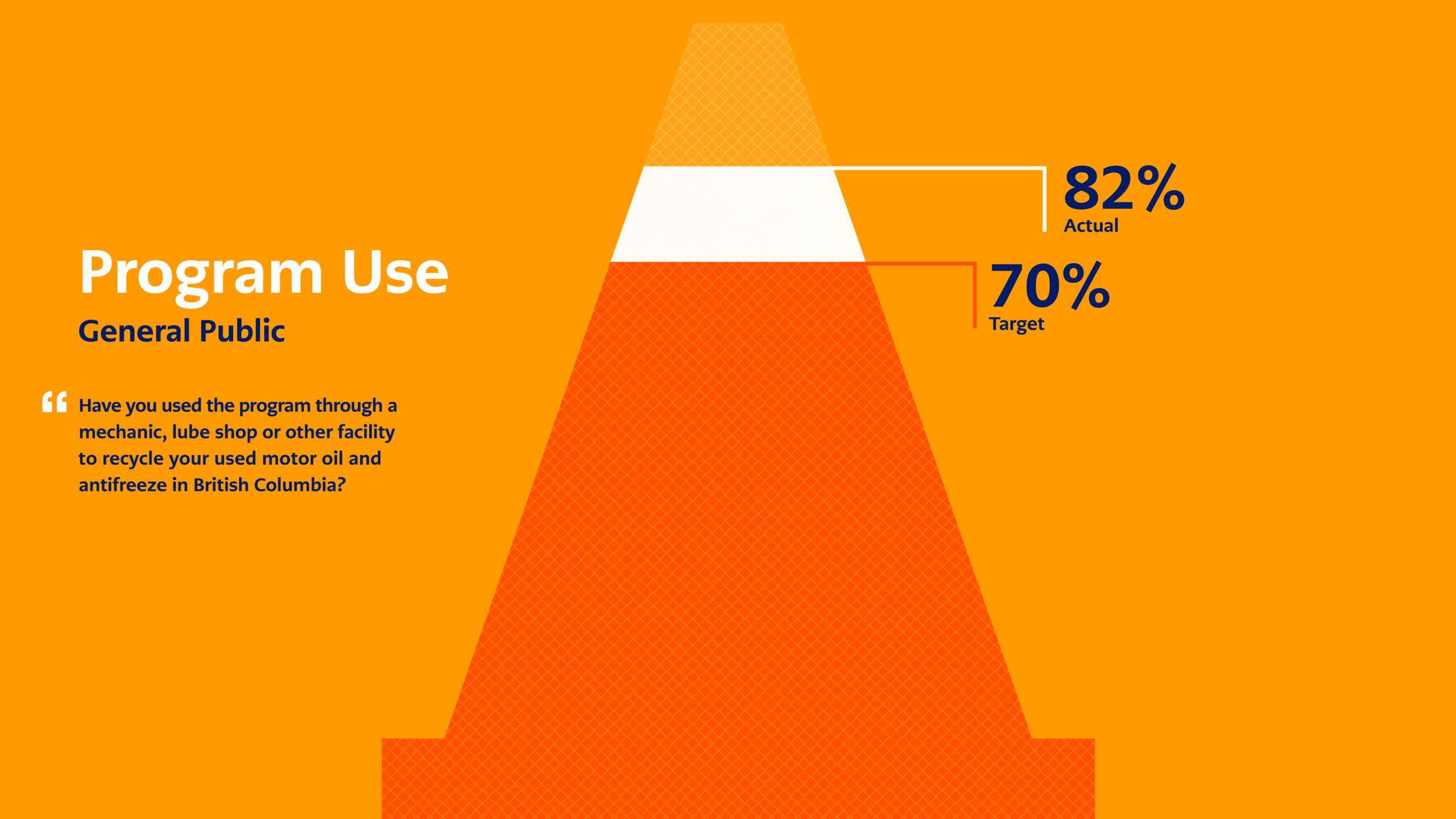
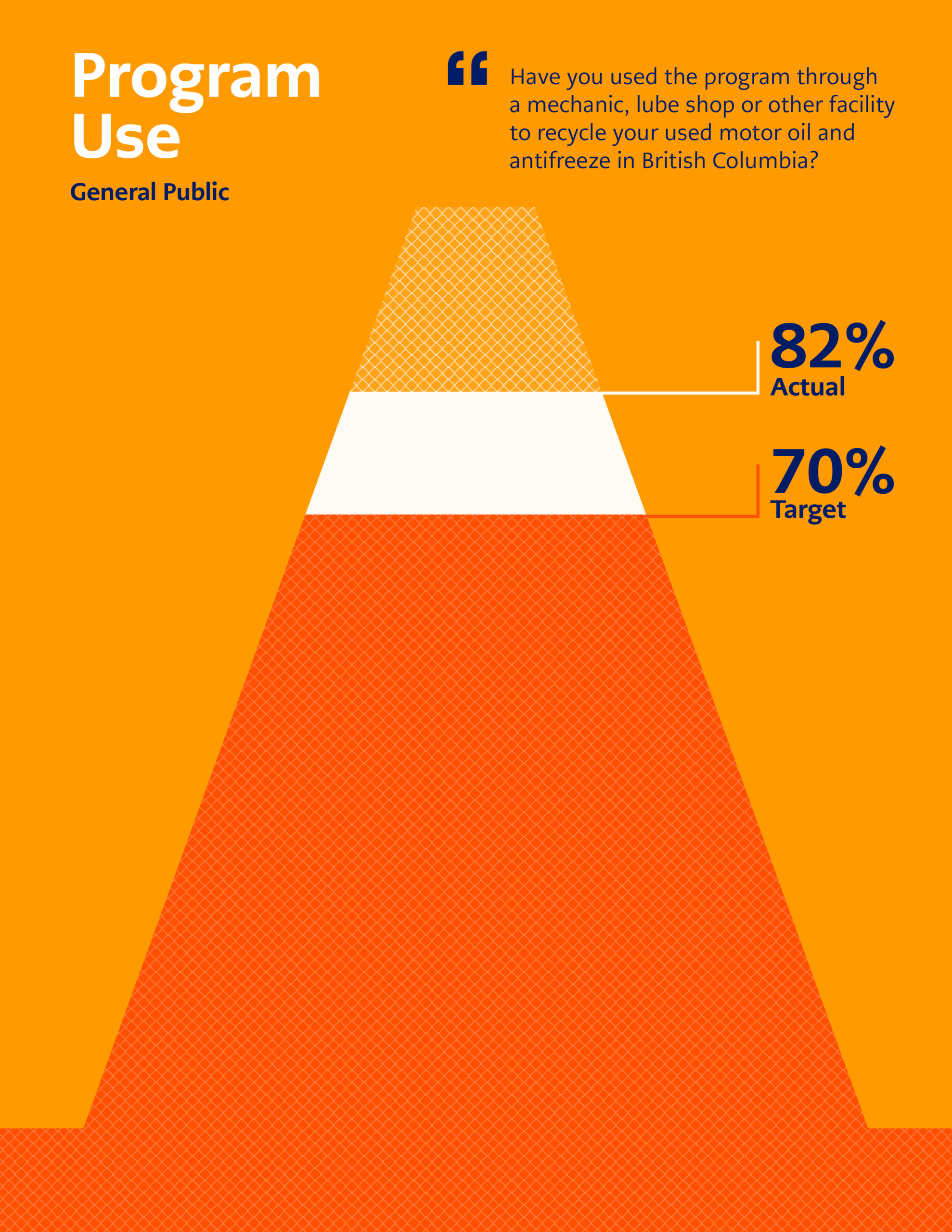
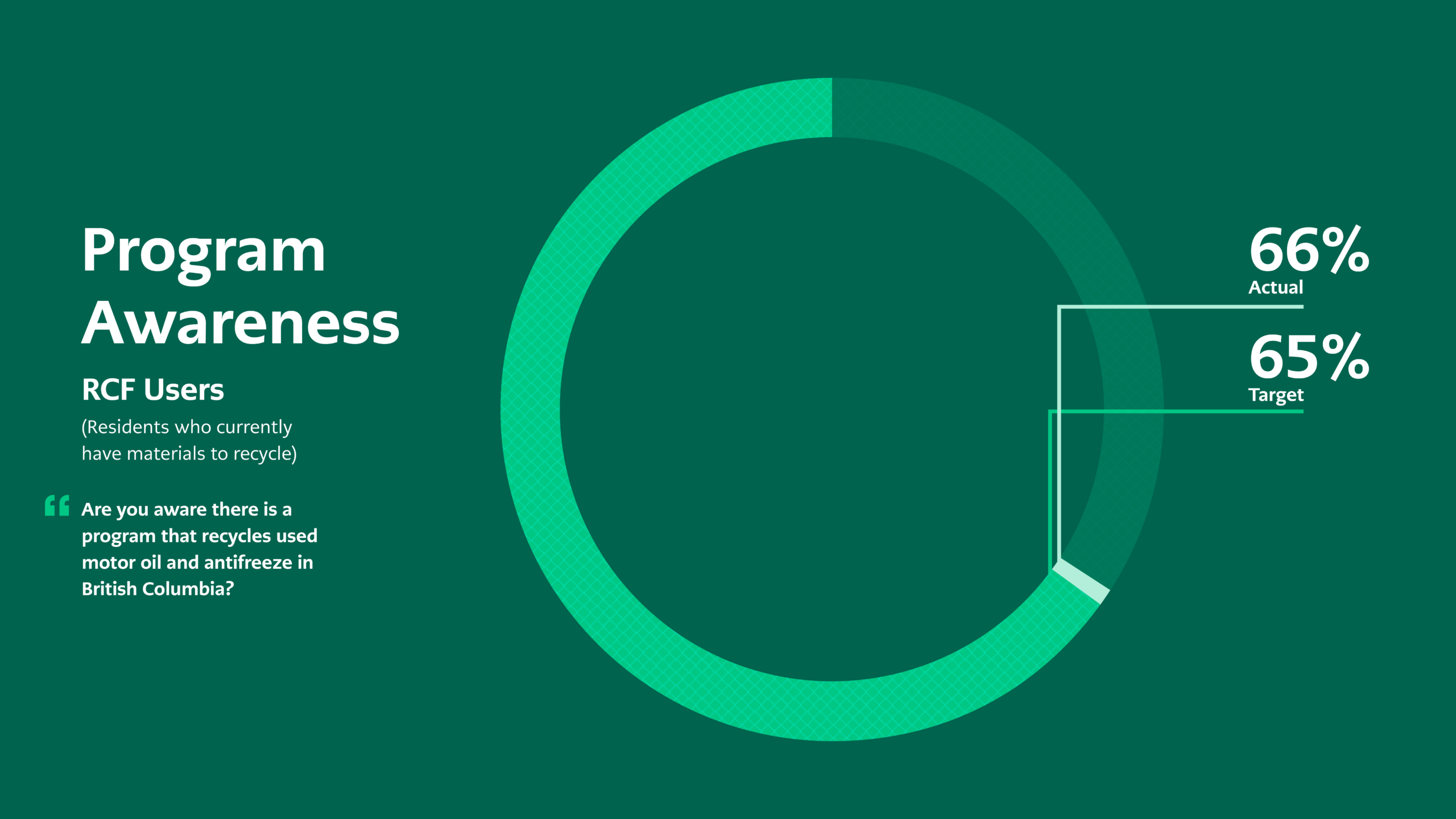
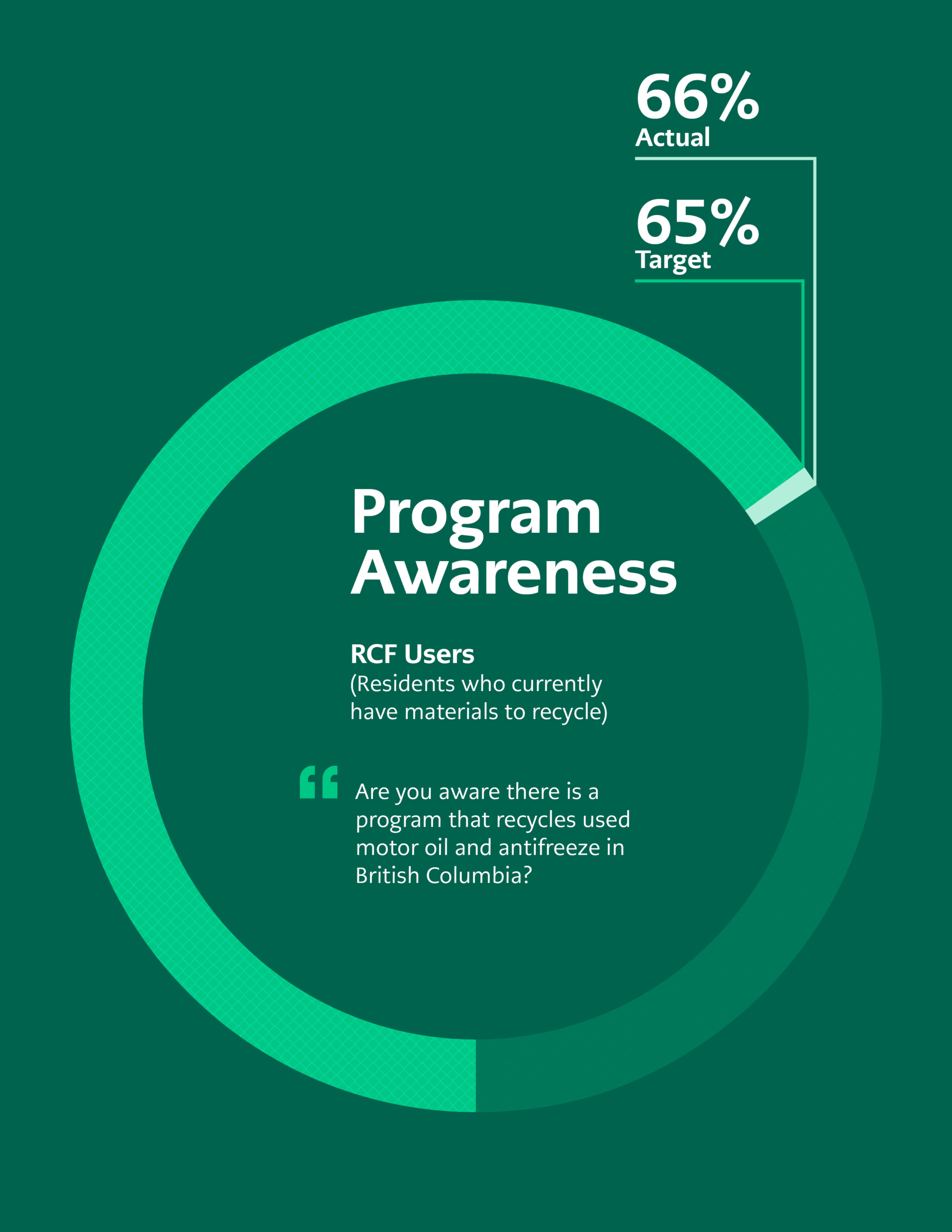
Key Collaborations
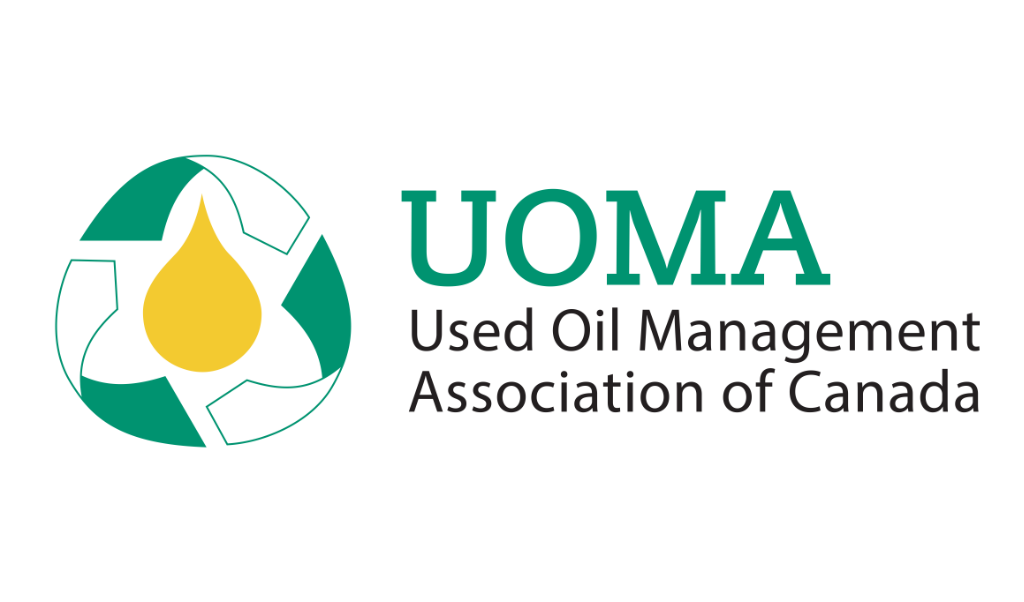
Provincial Programs (UOMAs)
Interchange Recycling works closely in partnership with eight other provincial programs through the national working group, the National Used Oil Material and Antifreeze Advisory Council (NUOMAAC) which coordinates the Canada-wide used oil and antifreeze materials recycling effort and encourages national standards. The UOMA industry-led stewardship program model works in close collaboration to achieve environmental, economic and socio-economic successes across Canada.
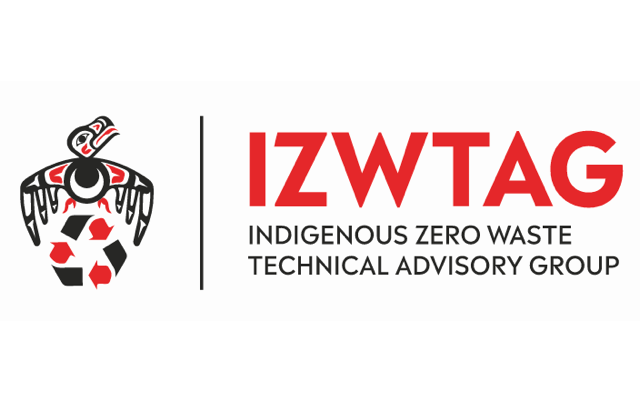
Indigenous Zero Waste Technical Advisory Group (IZWTAG)
Interchange Recycling is proud to have been the first Associate Member of the Indigenous Zero Waste Technical Advisory Group (IZWTAG), a non-profit society dedicated to supporting zero waste systems in all First Nation communities in BC. In 2023, Interchange Recycling worked with IZWTAG to ensure used oil and other program products were safely managed in First Nation communities and responsibly recycled.

Stewardship Agencies of BC (SABC)
Interchange Recycling is an active member of the Stewardship Agencies of British Columbia (SABC), an informal alliance of industry product stewardship organizations. SABC works with government, service providers and other stakeholders to ensure B.C.’s extended producer responsibility model is successful and cost effective.
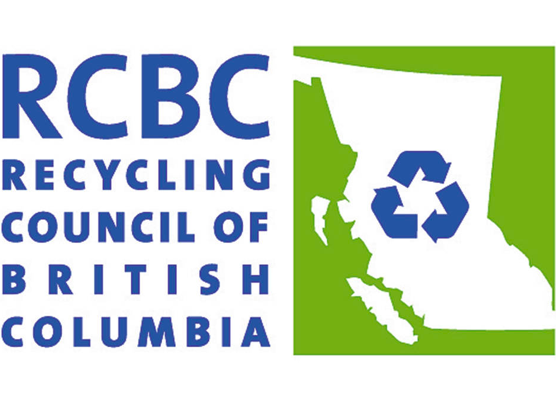
Recycling Council of BC
As part of our commitment to always ensuring access to key program information, Interchange Recycling helps fund the Recycling Council of BC’s hotline and Recyclepedia database. Consumers looking to have their recycling questions answered can call the hotline at 1-800-667-4321 or download the Recyclepedia app.
Collection Event Summary
In 2023, Interchange Recycling was proud to provide funding through our grant program to Regional Districts, municipalities, and other groups to support the following community collection events:
March 14 – Sicamous
Columbia Shuswap Regional District (CSRD)
March 14 – Sorrento
Columbia Shuswap Regional District (CSRD)
March 16 – Silverton
Regional District of Central Kootenay (RDCK)
March 16 – Kaslo
Regional District of Central Kootenay (RDCK)
March 16 – Salmo
Regional District of Central Kootenay (RDCK)
June 9 – Creston
Regional District of Central Kootenay (RDCK)
These community collection events are a great way for residents to safely return any materials and hazardous waste they have been storing in their homes and are unsure what to do with. Interchange Recycling is often one of several stewardship programs participating in the event.
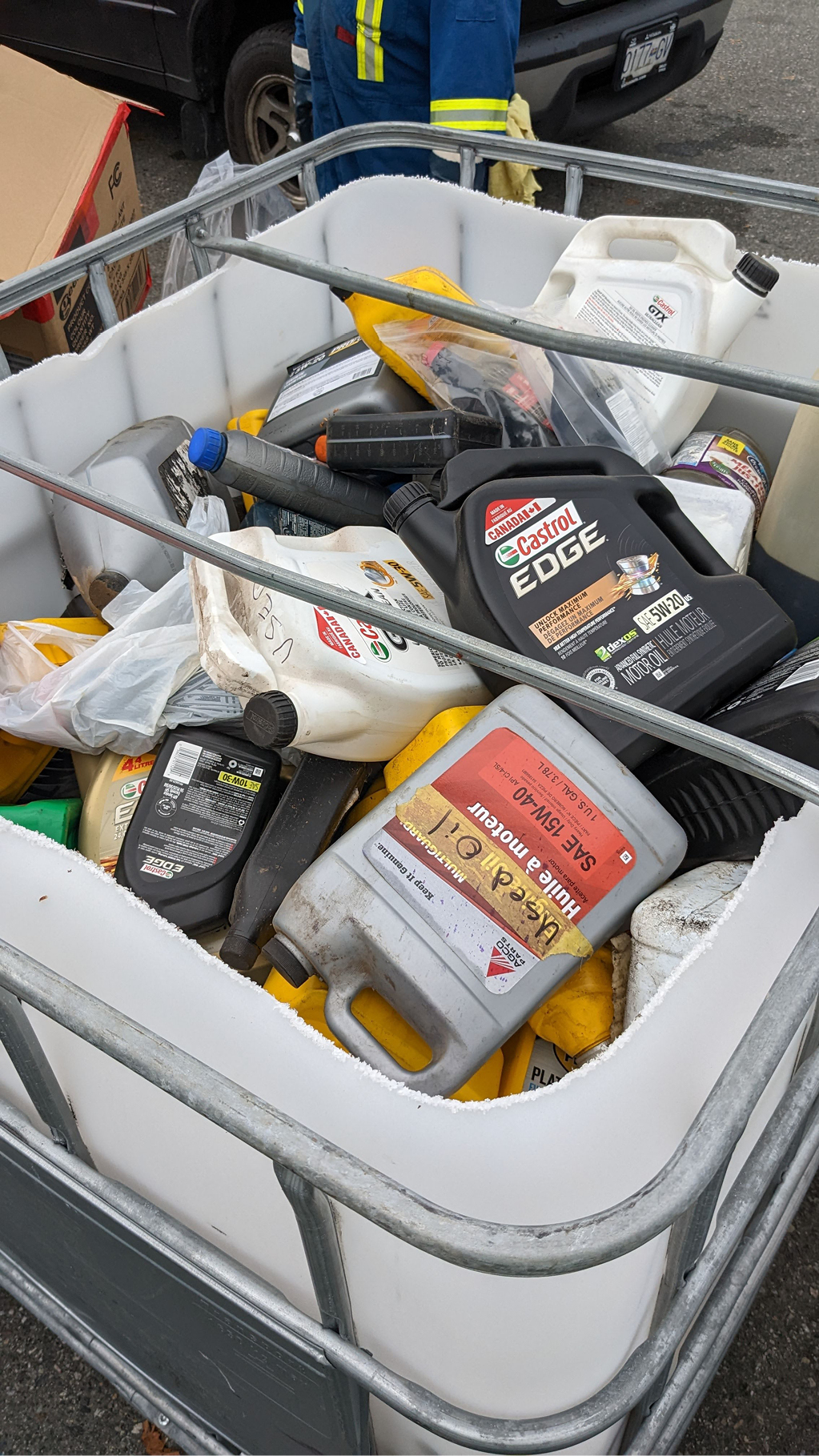
Collection Network Performance
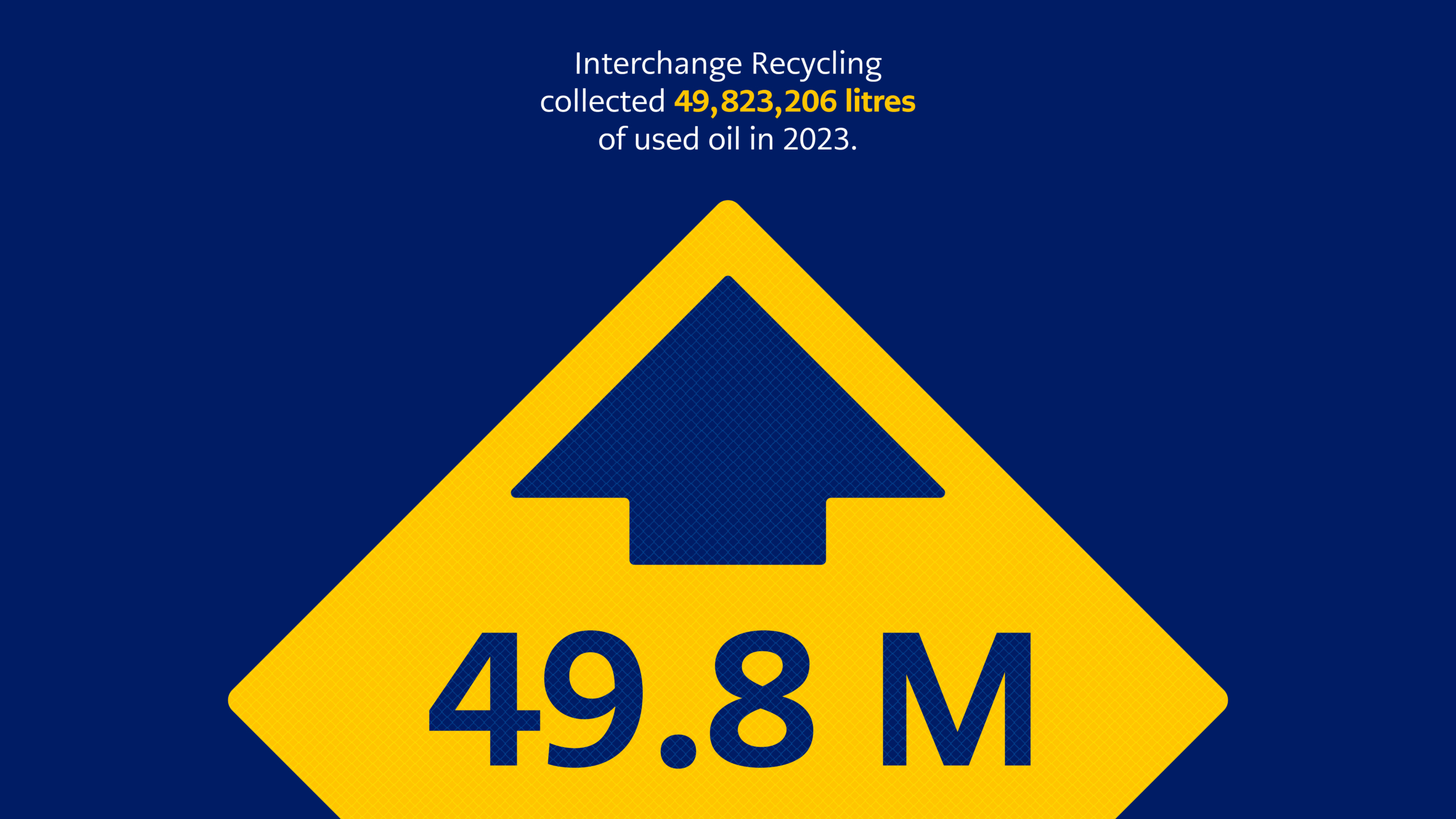
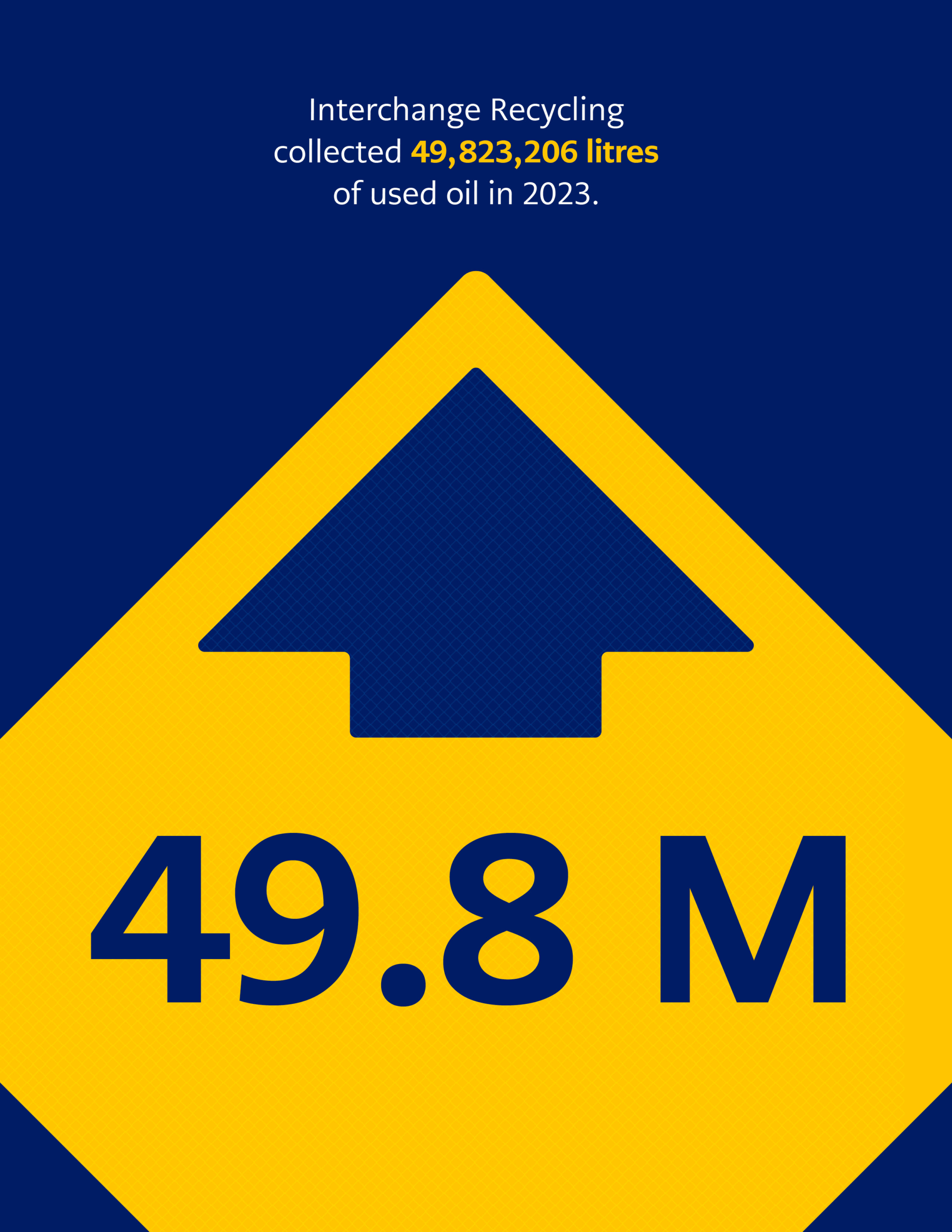
We are very pleased to share that our used oil collection totals increased in 2023 by more than two million litres. This success is a testament to the continued efforts of all of our partners who help ensure the safe collection of program materials.
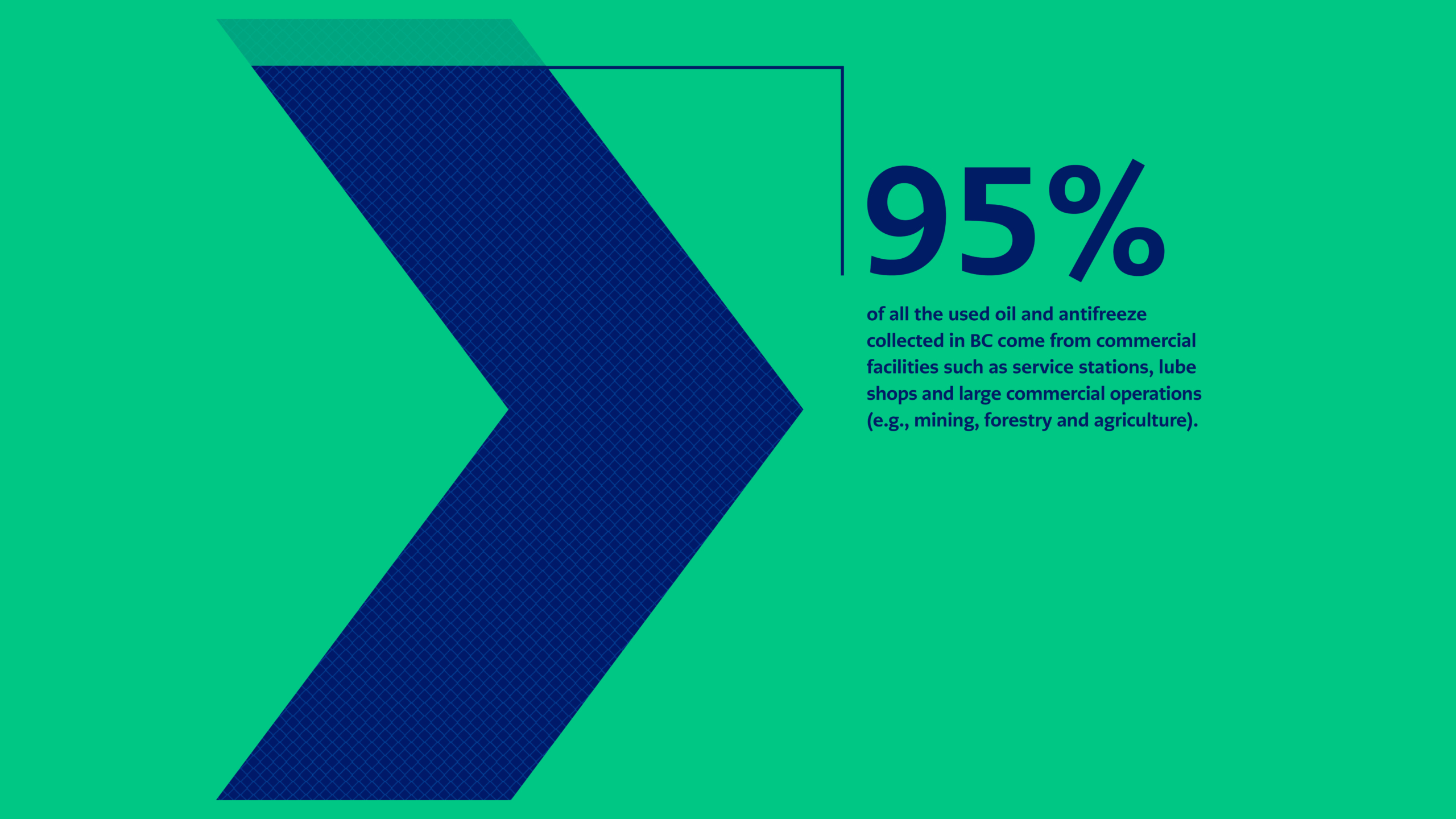
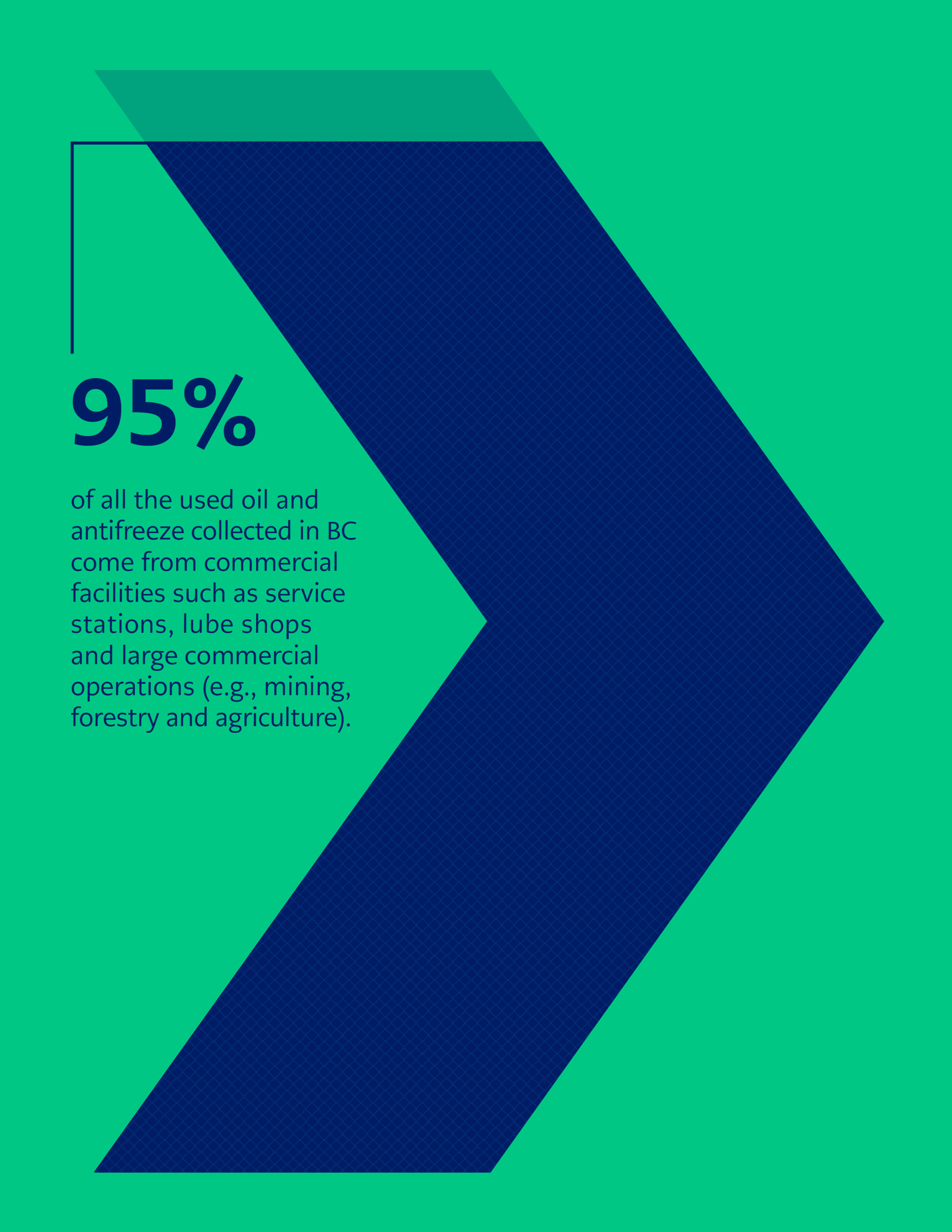
Of all the used oil and antifreeze collected in BC, most (95%) is collected from commercial facilities such as service stations, lube shops and large commercial operations (e.g., mining, forestry and agriculture). Our large network of generators operate across nine designated zones in BC and are typically serviced by a registered Interchange Recycling collector that has a service agreement with that facility. The collectors ensure that the only acceptable end uses for materials must be environmentally sound and in compliance with the regulation.
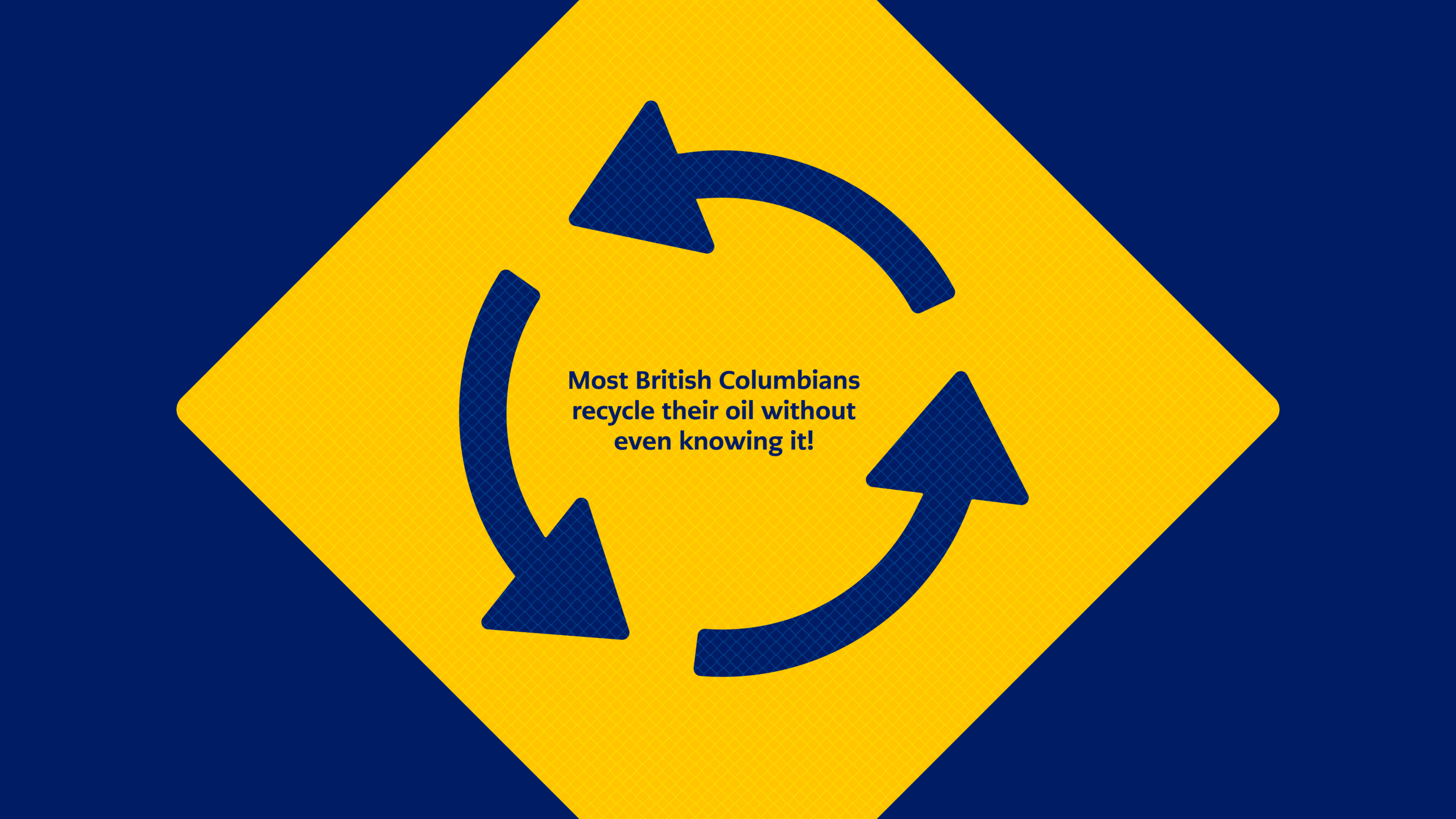
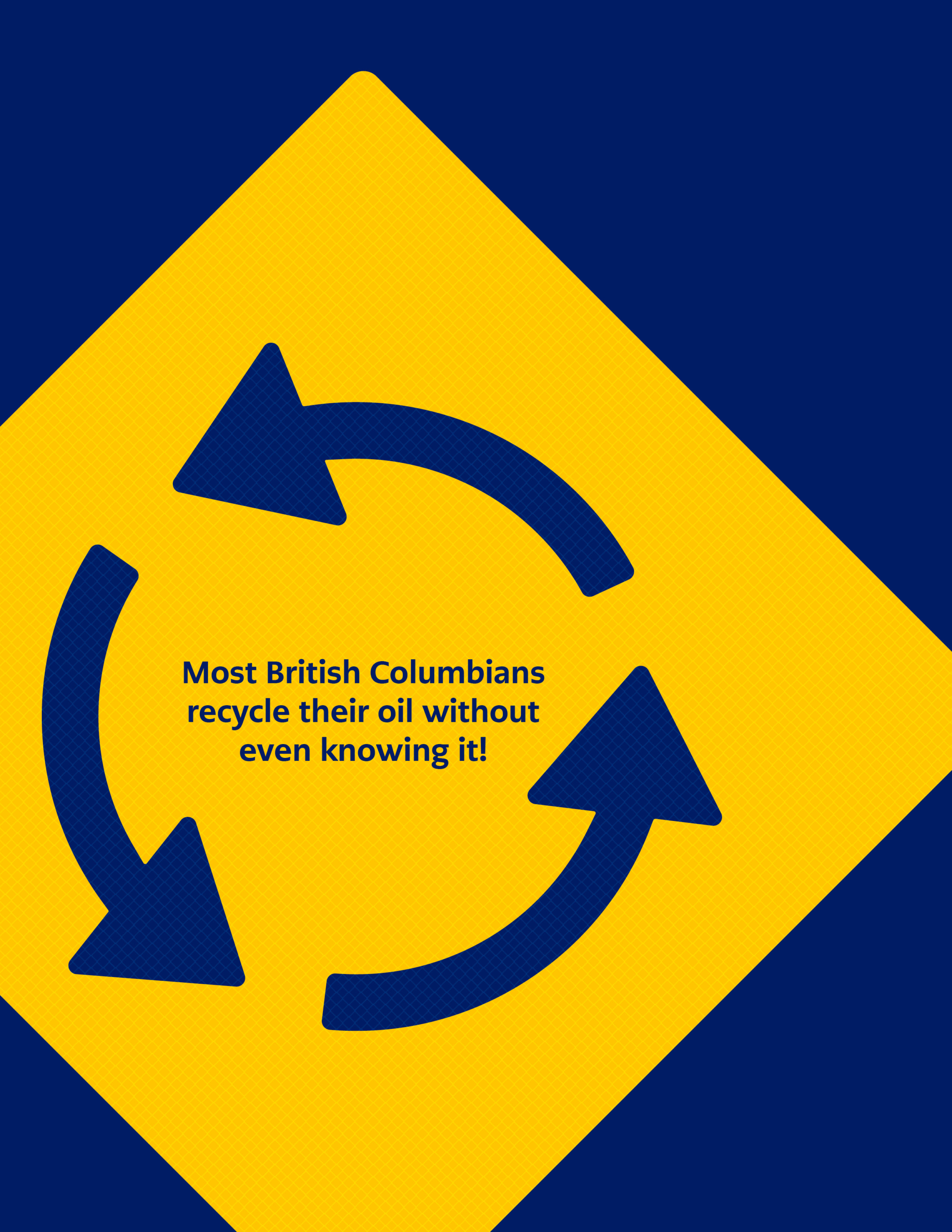
If you get your oil changed at a lube shop or by a mechanic, you are already doing your part to make sure your used oil stays out of the ecosystem. Only a small amount—approximately 5% of the total used oil and antifreeze collected in BC—comes from consumers that change their own oil/antifreeze or small commercial operators that choose to use the free consumer drop-off system.
For consumers that choose to change their own oil or antifreeze, Interchange Recycling has a province-wide network of registered public recycling centres that provide consumers with free access for recycling of program materials.
In 2023, there were 288 recycling centres located in high traffic retail locations, industrial sites, multi-material private depots (bottle depots) and local government recycling/landfill sites. Each year we look to identify areas of the province that need new facilities and work to find a partner in that area to support. Through the awarding of infrastructure grants, Interchange Recycling ensures each facility has the right equipment to manage program materials. In 2023, a total of 12 grants were awarded.
| Year | Number of Facilities |
|---|---|
| 2023 | 288 |
| 2022 | 289 |
| 2021 | 286 |
| 2020 | 273 |
| 2019 | 274 |
| 2018 | 291 |
99.4% of British Columbians currently have reasonable access to a recycling location. Interchange Recycling continues to work with recycling centre operators to ensure all public facilities are safe and secure by providing grants for new infrastructure such as modified sea containers with spill containment, collection tanks and consumer friendly signs.
Given the low product volumes represented by consumer collection, accessibility to recycling (see Page 26) is considered a more meaningful Interchange Recycling performance measure for this stream than the level of product recovery.
Interchange Recycling participates in the annual SABC Waste Characterization studies conducted at various local government waste facilities across the province. In 2023 a study was completed in the Regional District of Kootenay Boundary. We are proud to report that this study once again indicated that insignificant quantities of Interchange Recycling materials were being disposed of improperly.
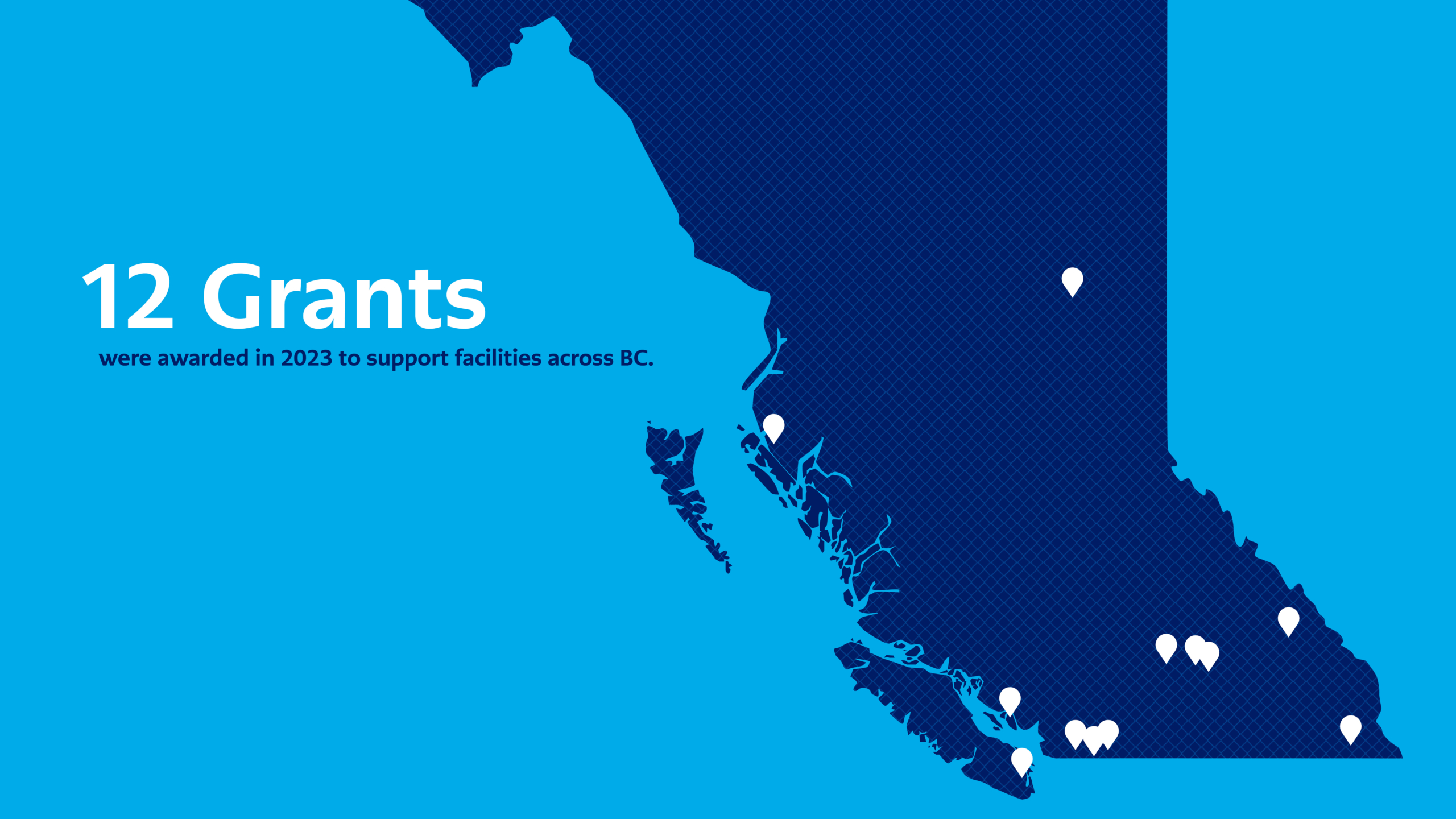
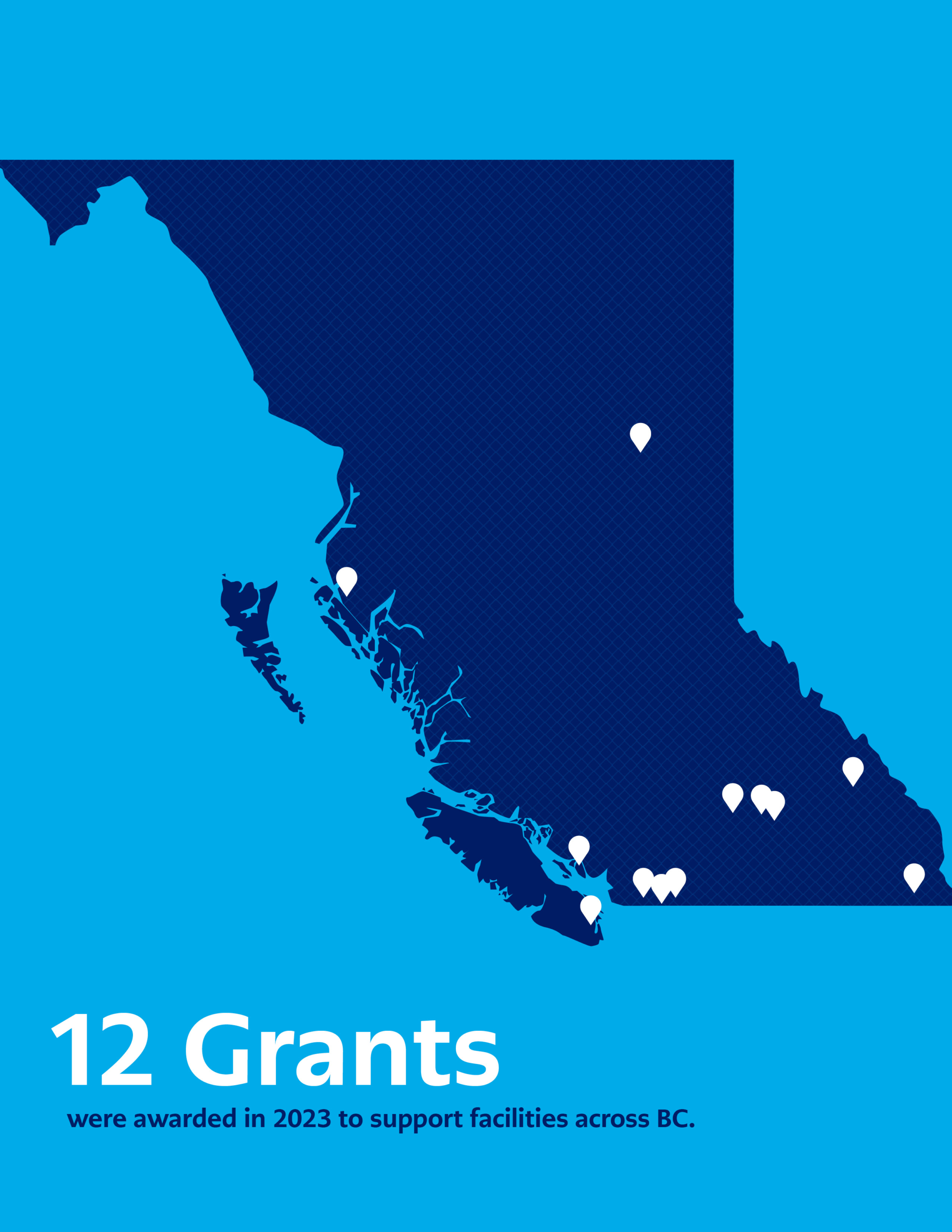
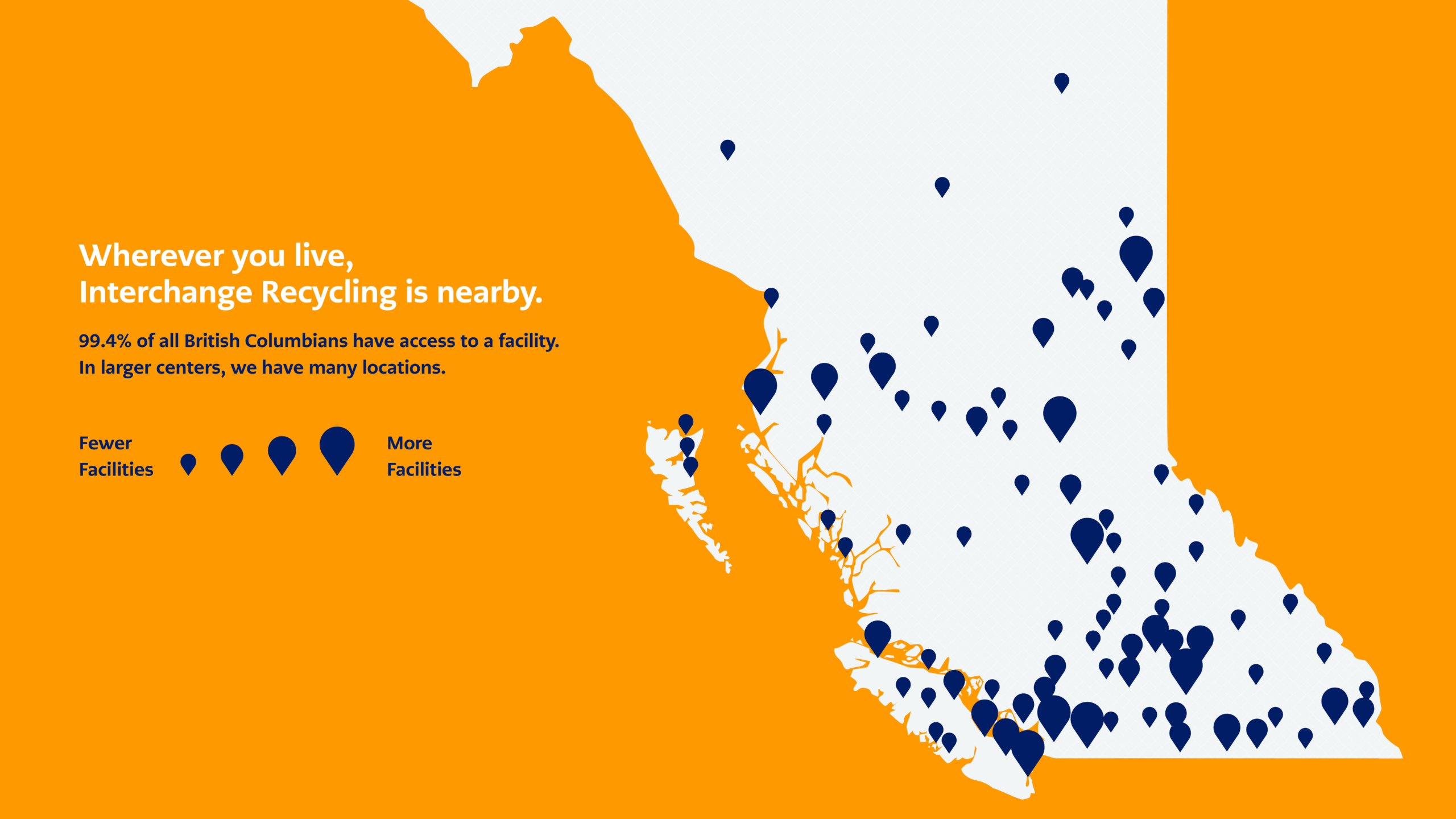
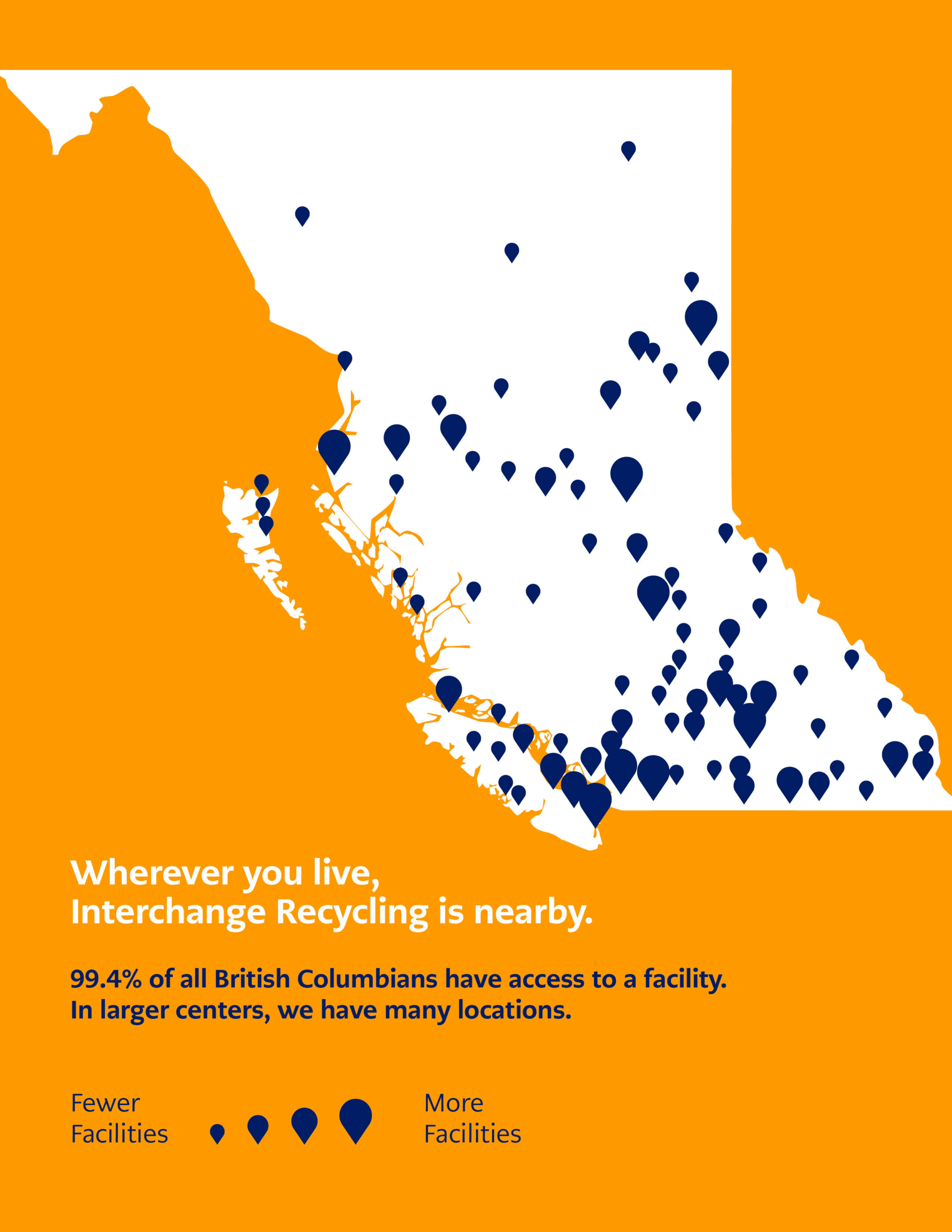
Accessibility
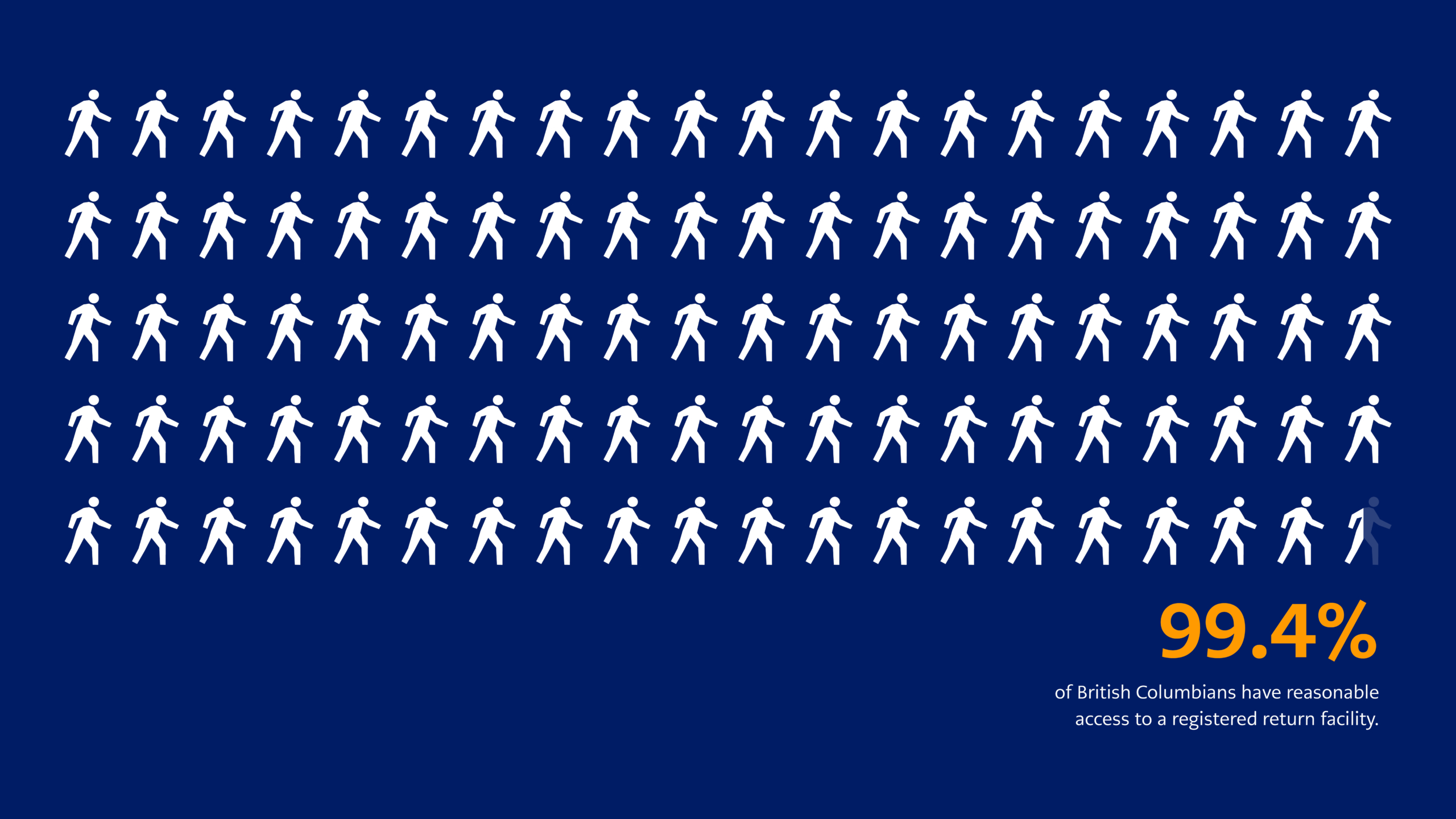
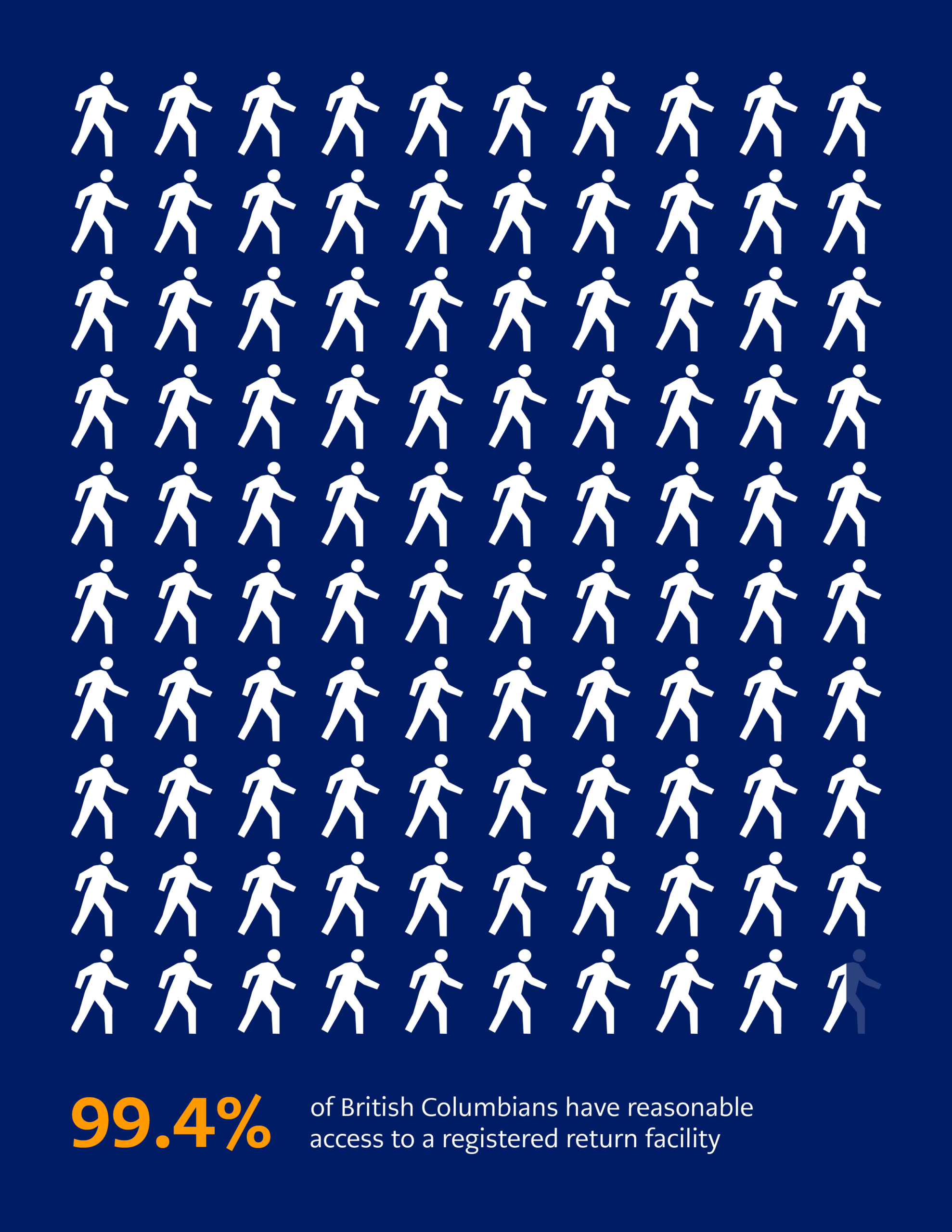
Ensuring that all British Columbians have reasonable access to a registered facility is a key goal for our organization. The Interchange Recycling accessibility standard has been developed to ensure that at least 95% of the BC population has access to a registered facility that accepts program materials. This standard is based on the following model:
| Community Type | Enhanced Service Level (target) |
|---|---|
| a) City, High Industrial | Minimum one facility |
| b) City, Low Industrial | Minimum one facility or one facility within a 15-minute drive |
| c) Town, High Industrial | Minimum one facility |
| d) Town, Low Industrial | Minimum one facility or one facility within a 15-minute drive or collection event |
| e) Village | Minimum one facility or one facility within a 30-minute drive or collection event |
| f) Other | Minimum one facility or one facility within a 30-minute drive or collection event as recommended by IZWTAG |
In addition to our to our network of public recycling centres, we offer mobile collection services and community collection events as a way to ensure reasonable access to our program.
Capture Rates in 2023
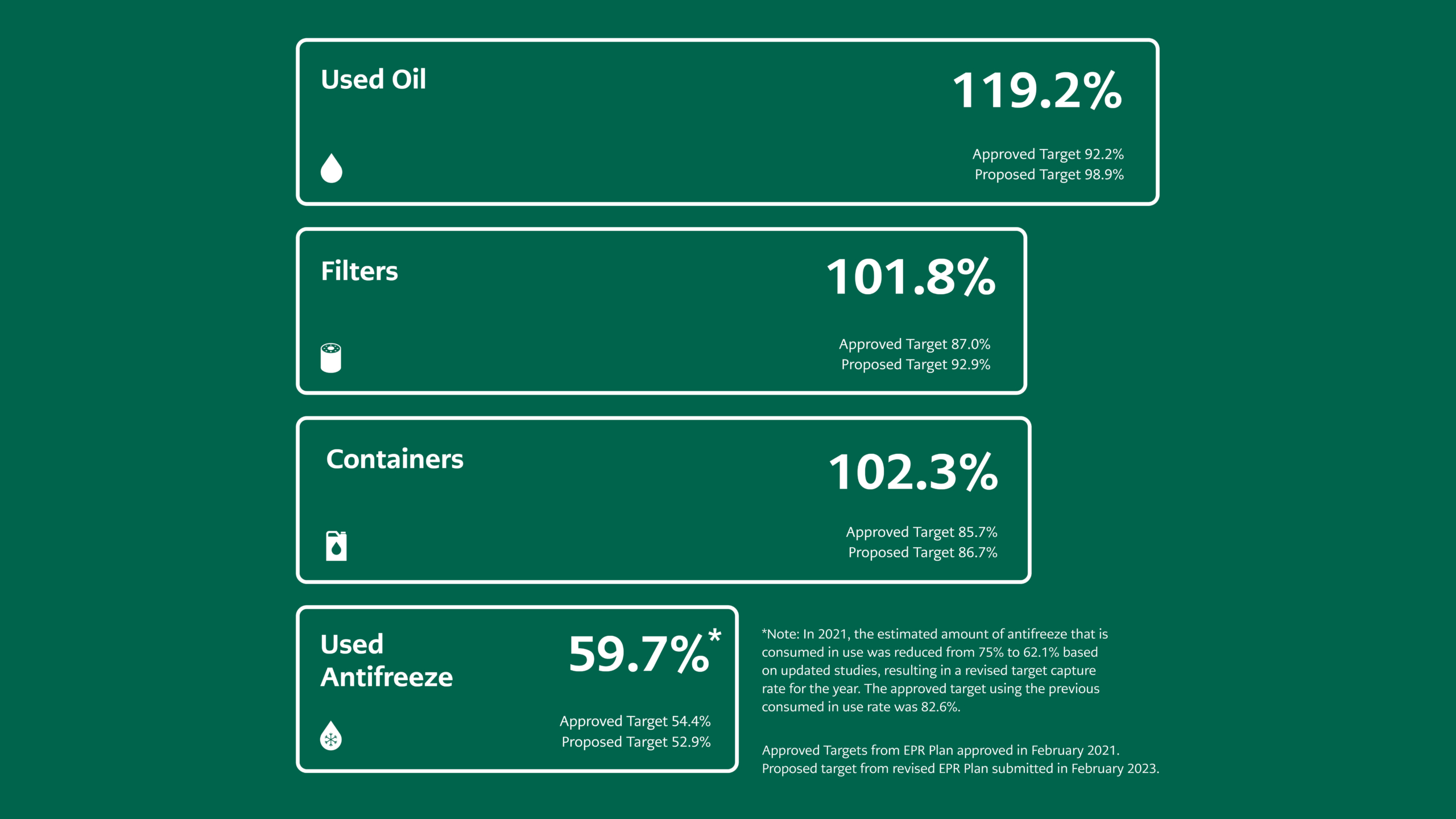
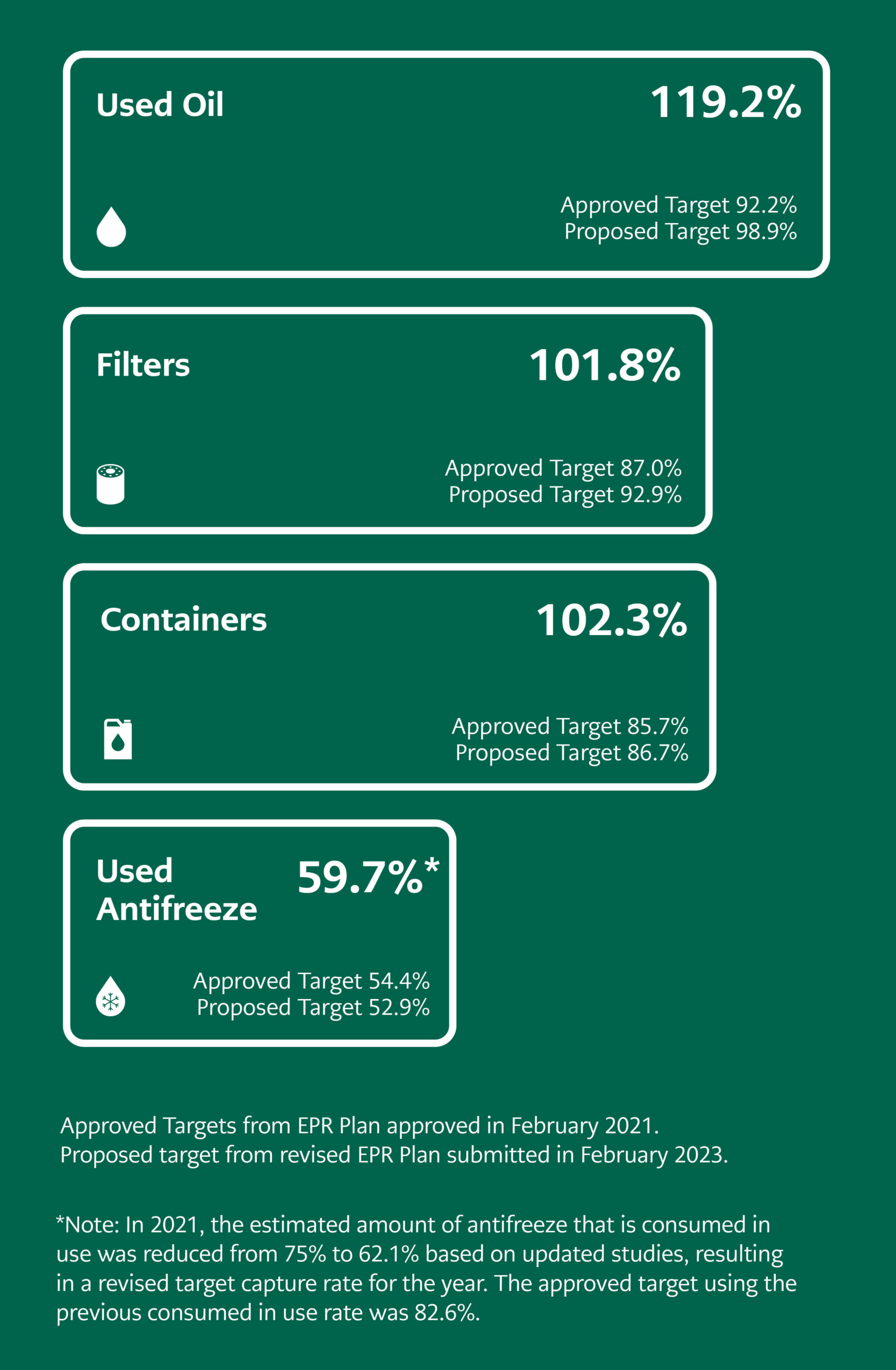
Product Collection
With over 20 years of history working in British Columbia, our product collection numbers consistently exceed the 75% benchmark identified in the Recycling Regulation.
Absolute collection for used oil, antifreeze, oil filters, used oil and antifreeze containers increased in 2023 by 4.4%, 3%, 7.3% and 1.4%. Product sales in 2023 decreased for oil, antifreeze, oil filters and oil and antifreeze containers by 10.4%, 28.9%, 11.3% and 8.8% respectively.
 Used Oil (Millions of litres) |  Filters (Millions of Units) | 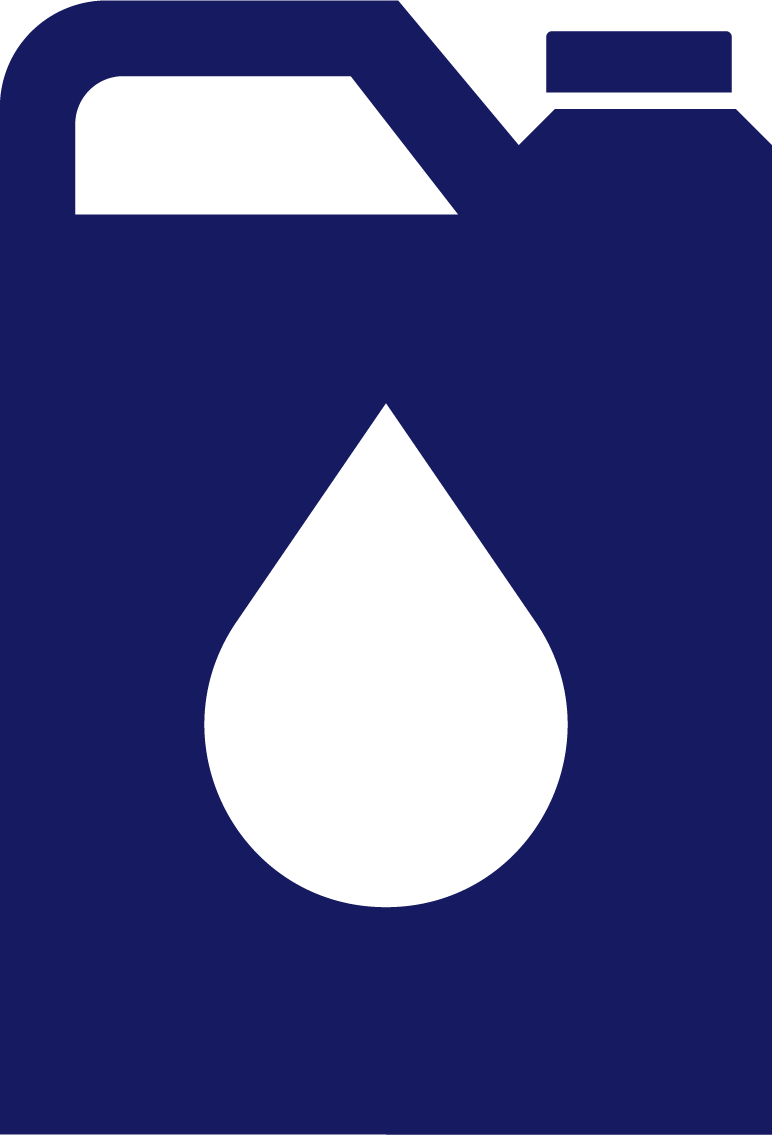 Containers (Millions of Kilograms) | 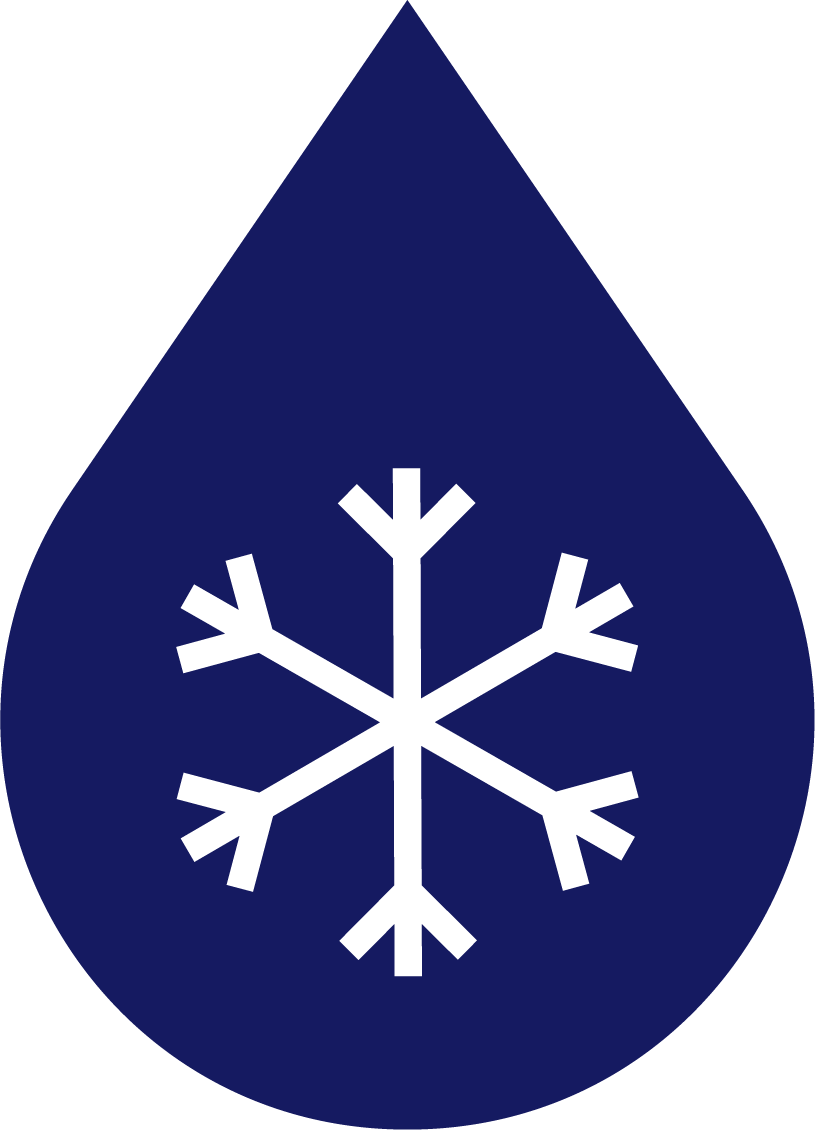 Used Antifreeze (Millions of Litres) | |
|---|---|---|---|---|
| Sold (2023) | 79.8 | 6.1 | 1.7 | 10.3 |
| Consumed in use | 23.4 | n/a | n/a | 6.4 |
| Repurposed | 14.6 | n/a | n/a | n/a |
| Available for collection | 41.8 | 6.1 | 1.7 | 3.9 |
| Collected | 49.8 | 6.2 | 1.8 | 2.3 |
| Capture rate* | 119.2% | 101.8% | 102.3% | 59.7% |
Only a portion of every litre of oil and antifreeze sold is available for recovery because an estimated 29.3% of the oil and 62.1% of the antifreeze is consumed during use and an estimated 26% of oil not consumed in use is re-purposed each year and is not available for collection.
The collection results by Regional District are provided on Page 33.
*We will launch a new study on available for collection looking at lost in use or repurposed by owner as we believe our our longstanding collection program is collecting everything available.
End Fate for Products Collected

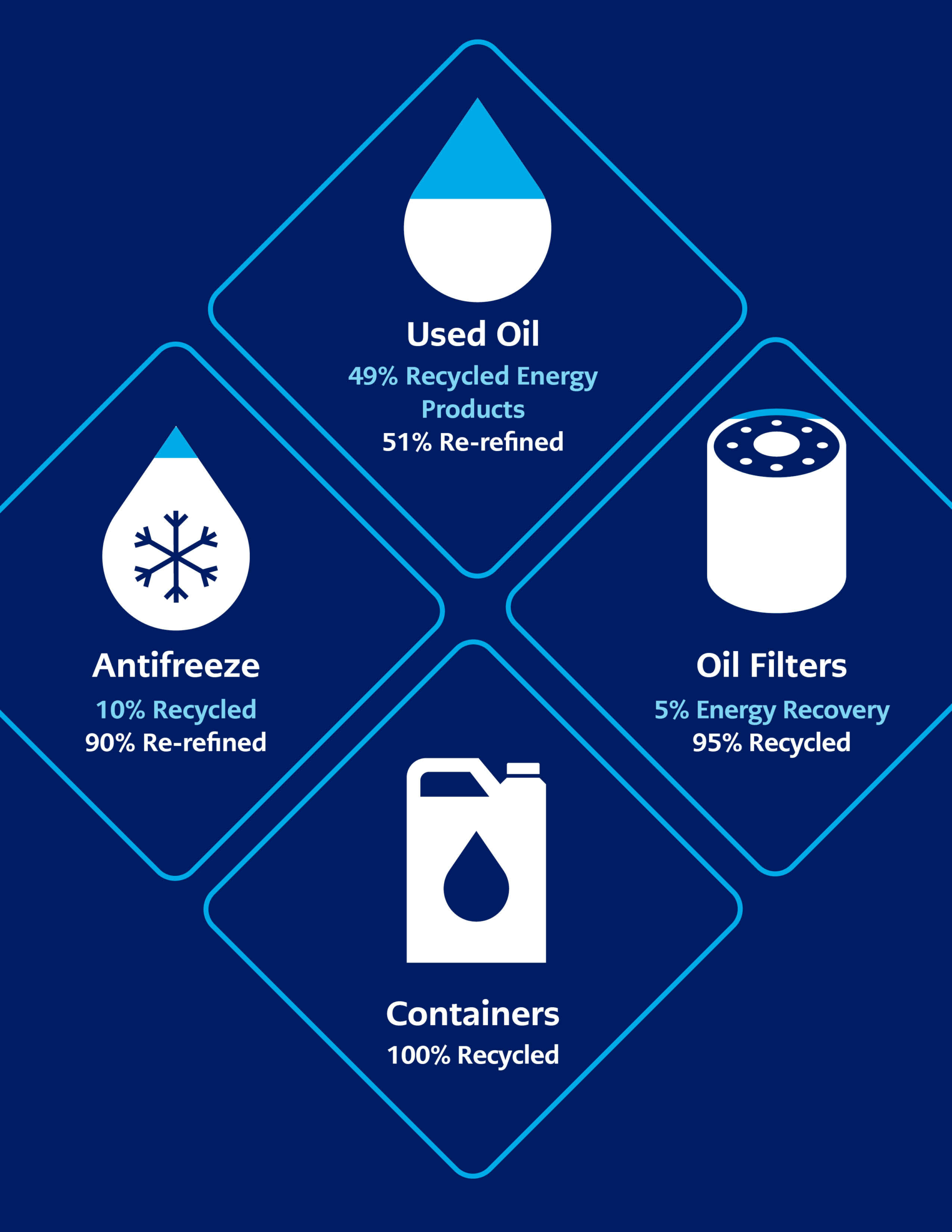
In 2023, our focus on sustainable waste management continued, with collected materials being responsibly managed in accordance with the pollution prevention hierarchy.
At the request of the British Columbia Ministry of Environment and Climate Change Strategy, we have refined our reporting approach, omitting industry-specific terminology from our definitions, to better align with Section 8.2(d) of the BC Recycling Regulation, providing a descriptive account of the management of collected products. This ensures transparency and accountability in our efforts to prioritize pollution prevention strategies and promote environmental stewardship.
Product Management
Collected products are managed in accordance with the Pollution Prevention Hierarchy as outlined in the BC Recycling Regulation.

Used Oil
Oil previously sold as lubricating oil is collected and re-refined into new lubricating oil. Some oil is collected, transformed and used as an industrial product. This includes re-refining and use as a fuel for pulp mills, cement kilns, asphalt plants and other uses that meet the Hazardous Waste Regulation or applicable government standards in other states or provinces, such as for mining explosives or exploration drilling.

Used Antifreeze
Antifreeze previously sold as an antifreeze product is recycled and reused as an antifreeze product. Antifreeze processors are already actively involved in processing used antifreeze to the point where an additive package can be included, and the recycled antifreeze can again be sold as automotive antifreeze.

Used Oil Filters
Metal filters are collected and recycled into other metal products like rebar, nails, and wire. The paper elements are processed through an oil recovery system with the residual being managed in a waste to energy facility.

Used Oil & Antifreeze Containers
Plastic and metal containers are recycled into new plastic and metal products. Interchange Recycling is proud of the fact that both used antifreeze and empty containers are processed and recycled at facilities right here in British Columbia. Managing these products locally provides significant environmental, economic and social benefits that support our transition to a more sustainable and Circular Economy.
